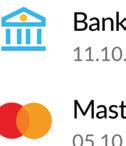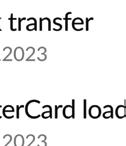




What are the most popular crypto coins in gaming? Check, check, check: Affordability and ID verification Retail, kiosks and land-based casino payments





















































































































































































































































































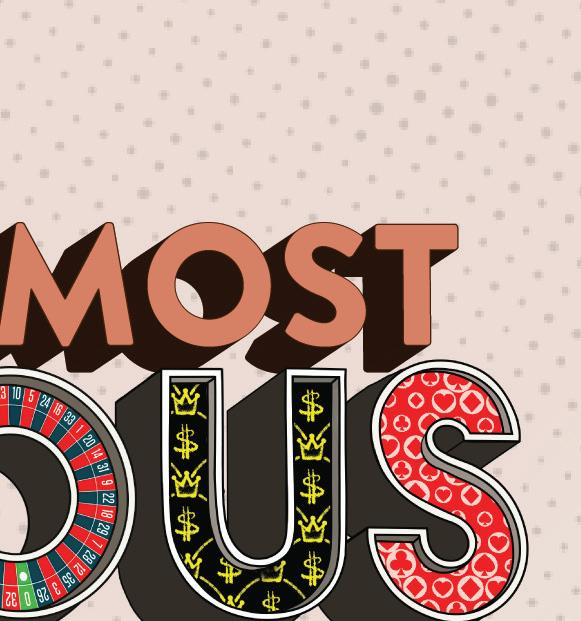


















































It is that time of year again, as we welcome all our readers to the pages of our annual Payments Focus magazine. Across this issue, you will find topics ranging from retail, the US, affordability, ID checks, kiosks and, of course, digital payments. And that’s all without mentioning that this edition is a cryptocurrency special.
As the Editor putting this magazine together, however, I am actually a little taken aback by the above list. A couple of years ago, there seemed to be two distinct focuses across gaming payments: how to make withdrawals and deposits as streamlined and frictionless as possible on the digital side – and how to make the land-based side as cashless as possible.
As time has gone on, the industry has seen the need for variety – even if that means offering a greater amount of old-fashioned options. Yes, society is becoming increasingly cashless. But has cash gone away completely? Not at all.
Just look at the Philippines, where the recent SiGMA Asia Summit was held. The Philippines is one of the foremost online gaming regions in Asia – but, with a bustling land-based casino sector in Manila, too, cash is king. The same can be said of plenty of other regions across the world.
Retail payments strategies are therefore paramount to success: kiosks, terminals and figuring out how payments form part of a gaming company’s omnichannel strategy.
Yet, from traditional retail payments to a far more modern concept in crypto, we can see that the simple idea of making a payment can provide a broad spectrum of potential methods and offerings.
In our cover feature, Gambling Insider speaks to several industry experts and breaks down the history of crypto payments – from their origin after the financial crisis of 2007, deriving from a distrust of the big banks, to the most popular cryptocurrencies used today.
Gaming and crypto have definitely come together. But today’s challenge for gaming firms is how to bring together crypto payment options, fiat payment options, online, retail and any other way in which a customer would like to pay.
ACCOUNT MANAGERS







Because, in business, those who adapt to what their customers want will always succeed in the long run. Those who try to dictate to the market, carefully explaining why they can’t offer certain options, will fall by the wayside –no matter how prestigious or previously successful they may have been.
TP, Editor












William.Aderele@gamblinginsider.com Tel: +44 (0)20 7739 2062
Irina.Litvinova@gamblinginsider.com Tel: +44 (0)207 613 5863
Serena Kwong
Serena.Kwong@gamblinginsider.com Tel: +44 (0)203 435 5628
NGarry Max.Ngarry@gamblinginsider.com Tel: +44 (0)207 729 0643
AWARDS SPONSORSHIP MANAGER
Michelle Pugh
Michelle.Pugh@globalgamingawards.com
Tel: +44 (0)207 360 7590
CREDIT MANAGER
Rachel Voit
WITH THANKS TO: Paul Kavanagh, Mandi Hart, Tamsin Blow,


6 GIVING USERS MORE CONTROL

Gambling Insider sits down with Paul Kavanagh, MiFinity CEO, to discuss why iGaming operators are switching from traditional online payment solutions
12 INTEGRATING CASHLESS PAYMENTS INTO LANDBASED CASINOS
Sightline’s Head of Product, Mandi Hart, discusses how the cashless integration process is carried out and the attitude shift from land-based casinos
18 UK AFFORDABILITY CHECKS: WHAT’S NEXT?
Gambling Insider runs through the latest developments related to affordability checks in the UK, with some help from legal experts
24 COMING TOGETHER: A NEW ERA FOR ONLINE GAMING?
Gambling Insider investigates the history of crypto gambling, the pros and cons of its use and why so many operators are integrating it into their platforms
32 PAYING IT FORWARD
Gambling Insider looks at how operators can use payment methods to support CSR and omnichannel
36 CLOSING THE OPEN-DOOR POLICY
Gambling Insider investigates how different countries are approaching ID checks for gambling





40 MAXIMISING RETAIL PROFITABILITY
Fivos Polymniou, Director of Ask Global, explains how kiosks that accept both card and cash payments can empower retailers
42 HOW TO ACHIEVE THE ‘HOLY GRAIL’ OF ID SAFETY & CONVENIENCE
Aware Biometrics CRO, Craig Herman, discusses ID checks and the ‘achievable’ goal of balancing safety with convenience
44 & 46 THE HOUSE THAT BITCOIN BUILT
Gambling Insider investigates the most popular betting cryptos in today’s market
PRAXIS TECH
PAYSAFE
PAYHOUND
PAYNEARME











What are some common pain points people experience when paying online with traditional online banking accounts or payment solutions (e.g. PayPal or Apple Pay)?
Traditional online payment methods often present several challenges. One of the primary issues we hear from users is the cumbersome and lengthy process of signing up for new accounts or linking their bank details. This can be particularly frustrating for individuals looking for quick transactions. Security concerns also top the list. Users are rightly cautious about sharing their personal and nancial information online.
Additionally, transaction fees can accumulate, especially for smaller transactions, leading many to abandon their purchases upon seeing the added costs. Cross-border transactions present another hurdle. They




















































often take a long time to clear, which is far from ideal in the iGaming environment, where players want to fund their accounts and start playing immediately.







































Gambling Insider sits down with Paul Kavanagh, MiFinity CEO, to discuss the supplier’s goals, and why iGaming operators are switching from traditional online payment solutions
is particularly appreciated by iGaming customers who prefer direct payouts to their bank accounts.
You offer over 75 payment methods to customers. Which of those are most popular and are there any that are more popular than you anticipated?
Our eVoucher has gained signi cant traction, exceeding our expectations. It is particularly popular in the iGaming sector due to its exibility, allowing users to utilise eVouchers for personal online transactions, and as gifts for friends and family. This method is especially favoured in regions where traditional online payments pose challenges.
Local direct bank transfer solutions are also well received. Our PayAnyBank service, which supports both B2C and B2B payments,
Could you tell me a bit more about your eVouchers? What was the thought process in creating them and why do customers use them?
The MiFinity eVoucher was developed to give users more control over their online spending, combining the ease of digital payments with the security and privacy of cash. It functions similarly to a gift card, usable for various online purchases, including iGaming. This secure eMoney product facilitates instant online deposits in multiple currencies and denominations worldwide. Users can top up their MiFinity accounts with the voucher and use those funds across hundreds of iGaming operators.
This flexibility makes it an excellent budgeting tool and, crucially, it allows users to maintain privacy by not sharing personal details online.
For players, this means easy account top-ups regardless of their location. For operators, it opens new markets and caters to a broader audience, making it a truly global payment solution. It also complements other payment methods, offering players more choices.
What are some unique needs for iGaming platforms and how does MiFinity look to cater to those?
Seamless, instant transactions and an excellent customer experience are critical in the iGaming industry, and MiFinity provides these. Players need to deposit and withdraw funds quickly without disruptions, so our eWallet transactions are instant, allowing uninterrupted gameplay. Security is also a top priority. We implement advanced security measures, including the latest encryption and secure authentication methods, to protect our customers and partners. Our platform also features robust fraud detection systems with advanced monitoring, and reporting tools to detect and respond to potential fraud in real-time. Moreover, the iGaming market’s global nature necessitates a wide range of payment methods and support for multiple currencies. MiFinity offers familiar payment options that users trust, no matter where they are located. Our cross-border solutions support our iGaming partners’ market expansion strategies. The needs of the iGaming industry are continually
evolving, and MiFinity is designed to adapt through the flexibility and scalability of our solutions. We continually innovate by adding new features, integrating fresh payment methods and complying with new regulations to stay ahead.
What are MiFinity’s biggest goals for this year and beyond?
MiFinity aims to become a global leader in seamless and secure payments, breaking down barriers and enabling transactions anywhere in the world. Our focus includes expanding into new markets globally, which will allow us to serve more people and merchants, solidifying our position in the fintech industry. We also plan to diversify our services beyond traditional payments, offering multi-eWallet currency exchange capabilities to simplify financial management for our customers.
Latin America represents a significant opportunity due to its booming digital economy. We plan to collaborate with local banks and businesses to establish a strong presence, and provide tailored payment solutions for the region. We will also invest in educational initiatives to promote the benefits of digital payments and encourage broader adoption. Our expansion strategy includes leveraging our MiFinity Affiliates and MiFinity Bonus channels to grow in these markets. Asia is another promising market, and we will develop products and services that cater to the unique preferences and regulations of each country.
As a tech-driven company, staying ahead technologically is crucial. We are committed to constant innovation and implementing

cutting-edge solutions. We aim to establish ourselves as an innovation hub in the fintech sector, setting new standards for secure and seamless financial transactions. Ultimately, MiFinity strives to create a world where payments are frictionless, secure and accessible to everyone, regardless of location. We also see ourselves as growth partners for our merchants, helping them overcome challenges related to market expansion, compliance and security. By providing tools to streamline processes and offering robust security solutions, we build trust and credibility within the iGaming space for both operators and players.

Praxis Tech’s CTO Guy Karsenti highlights how the company’s Payment Orchestration Platform liberates iGaming merchants from restrictive Gateway, PSP and Acquirer agreements. It also enables them to scale operations, diversify payment options, and leverage advanced features in conversion and transaction approval.
As an iGaming merchant, you’re constantly bombarded by various gateways, payment service providers (PSPs), and all-in-one solutions promising better, quicker, cheaper and safer payments. While these promises may be true some of the time, you often find yourself locked into your current payment systems due to the time, cost and technical challenges of integrating better solutions.
This lock-in can prevent merchants from utilising best-in-class payment solutions that streamline their payment operations, and from offering their players a more intuitive transaction experience with features like one-click payments in live games, multilingual checkouts, and automatic top-ups when balances fall below a certain threshold.
Perhaps most importantly, it limits them from offering their global customer base the local payment methods they all prefer, such as PIX in Brazil, UPI in India, or Apple Pay and PayPal in Europe.


“As a result, merchants miss out on opportunities to enhance their players’ experiences, which inevitably impacts their conversion rates, retention levels and even their transaction approval ratios.”
The solution to this problem lies in choosing a PSP-agnostic Payment Orchestration Platform like ours, which allows merchants to choose from over 600 pre-integrated PSPs and access 1000+ alternative payment methods (APMs).
“By connecting to our platform through a single API integration, merchants save costs, increase revenue and strengthen their ability to scale their operations, all while also bene ting from additional services not o ered by basic gateway solutions.”
Our Decline Recovery suite, for example, tackles common issues that lead to transaction declines in the iGaming industry, enabling merchants to recover up to 20% of payments that would otherwise have been lost last year.
We’ve recently expanded this suite with our 3DS Cascading feature, which intelligently re-routes payments encountering processing issues, sparing users the frustration of having to reattempt their transaction and undergo multiple identity checks, significantly reducing abandoned payment sessions.
This feature is part of our broader cascading functionality, which seamlessly redirects transactions across various payment methods and scenarios. For instance, if a payment is initially sent to a PSP experiencing downtime, our platform immediately redirects card payments to alternative PSPs and can also switch card payments to Open Banking routes, or even shift card payments to popular alternative payment methods (APMs) through our Retry with APM feature.
This, alongside our APM Cascading feature that similarly allows us to route the same

APM to substitute PSPs in case of technical issues, enables us to better support iGaming merchants’ payment needs as their players show an increasing preference for non-card payment methods.
We also prioritise offering our merchants’ customers quicker deposits by securely tokenising and storing their payment details using the latest PCI DSS standards.
Our Background Dynamic Currency Converter (BDCC) also enables businesses to accept multi-currency payments, even if their gateway doesn’t natively support this functionality. This enables them to effortlessly expand their reach and tap into new markets.
When dealing with multiple currencies, however, providers require certain safeguards to protect against FX market fluctuations that may occur while a withdrawal request is being processed.
To address this, our Lock FX Rate Management suite offers merchants added protections, showcasing how our Payment Orchestration Platform was designed with the industry’s specific needs in mind.
We’re not stopping there and continue to invest and innovate our solutions. This includes adding a Network Operations Center (NOC) in Dubai earlier this year to boost our resilience and continued investment in building our team across both our Limassol HQ in Cyprus and Dubai regional office in the UAE.
“Constantly aiming higher, in 2024 our target is to con dently surpass $5.5bn in approved transaction volume, having approved over $4.5bn last year.”
Merchants looking to break free from the limitations of their existing payment systems and embrace a more exible, e cient and pro table solution should visit our website and get in touch to learn more.




















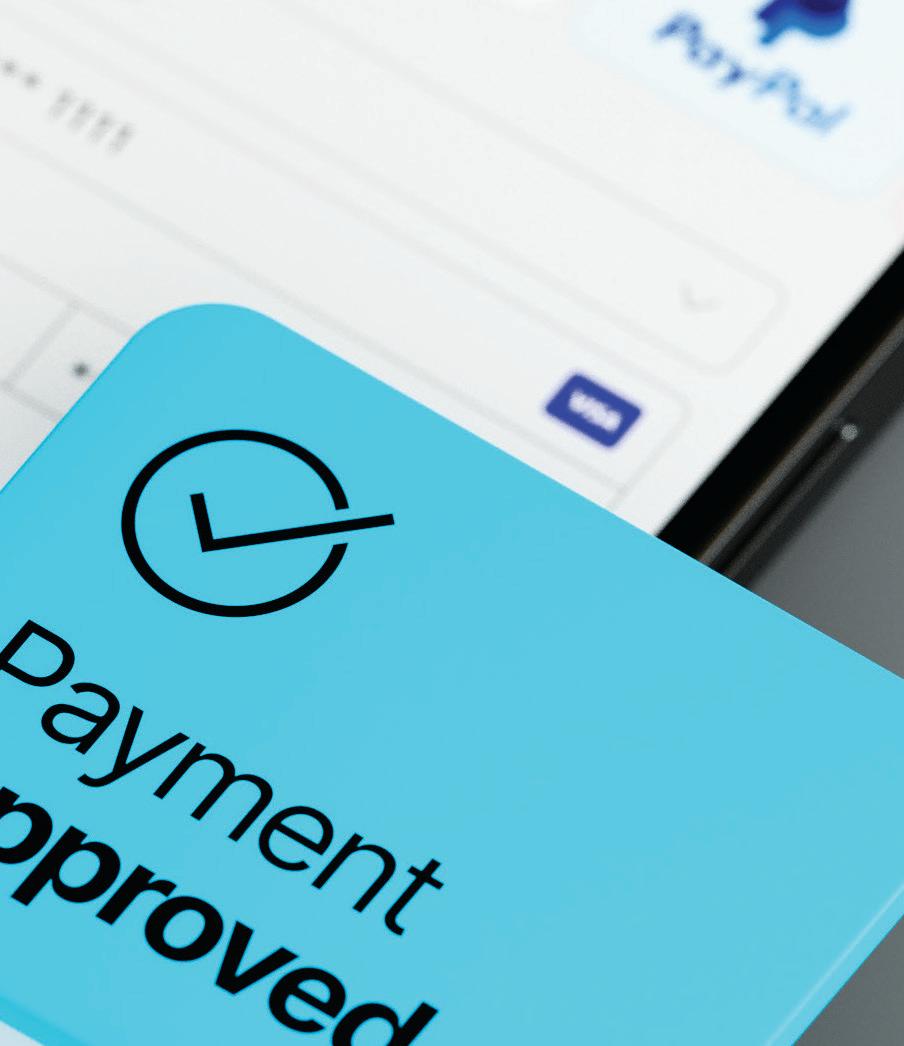

Cross-border payments are no longer optional – they’re a must-have for any merchant who wants to make a splash in the global iGaming scene
Jonathan
Vintner, Global Head of Sales, PayRetailers

At PayRetailers, we handle cross-border payments with ease, giving merchants the edge they need to stand out and o er their gamers an unparalleled experience.
PayRetailers is a payment processor operating in Latin America and Africa. We equip our merchants with the tools they need to embrace a borderless state of mind.
With our single, flexible API, we deliver a neatly wrapped, one-stop-shop solution that allows merchants to accept both traditional and local payments and process cross-border transactions.
What was once a bold ambition in 2017 has since transformed into an extraordinary reality – today we offer 300+ payment methods in over 20 countries.
Our ambitious vision is embodied by our recent acquisition of Transfeera, a payment institution that leads the payments scene in Brazil. With advanced technology that will grant PayRetailers access to PIX directly from BACEN, Transfeera is the ideal partner for our strategic growth in Brazil.
The transaction remains subject to approval
from the Administrative Council for Economic Defense (CADE) and the Central Bank of Brazil. Until then, we are thrilled about this acquisition and how it will strengthen our combined position in the Brazilian payments space.
When it comes to payments in iGaming, we tick all the boxes:
• Instant payments
• Fraud protection
• Tailored service
Today’s intrepid iGamers don’t want to idly wait around – they want to seize the opportunities that come their way immediately. Unlocking instant payments is easy for merchants who integrate PayRetailers into their infrastructure, as our technology empowers customers to pay and play when it suits them.
Protecting people from fraudulent activity is also top of mind – now more than ever. As a concerning rise in fraud schemes plagues today’s iGaming sector, we remain committed to offering our merchants robust fraud protection and KYC procedures that keep iGaming both fun and safe.
Our technology is complemented by a people-centric approach, as we also work tirelessly to put our customers first. Our scalable infrastructure powers long-term growth as businesses expand over time, and our support team is on-hand 24/7 to provide assistance.
In short, we go all in when it comes to our customers.
Seven licences speak for themselves.
At PayRetailers, we mitigate the risk for our clients and prioritise regulatory compliance. We do so by working tirelessly to obtain the licences we need to operate as a payment institution and electronic money issuer in the countries we serve.
The latest licences added to our portfolio were for Brazil and Argentina, cementing our status as the go-to global payments company for merchants who handle process cross-border transactions.
The work that goes into obtaining these licences brings us great pride, as it grants us the robust reputation and seal of professionalism that today’s go-getter merchants seek.
There’s no need to go in blind when you work with us – we’ve got you covered every step of the way.
As for our own bets, we go all in on the future.
Our most recent endeavour was our expansion into East Africa in May, which saw us elevate the service we provide cross-border merchants and strengthen our global presence.
With this launch, PayRetailers now offers coverage in Rwanda, Zambia, Uganda and Tanzania. We are delighted to do so by giving our merchants access to SPENN, Airtel and MTN, enabling them to facilitate the mobile payments that are so prevalent in Africa’s financial infrastructure.
This exciting development, which will empower our merchants to thrive in the African region, will be followed by future growth in Africa. Our eyes are set firmly on the horizon as we size up future operations in West, North and Southern Africa, and consider how we can boost business growth and financial inclusion in this dynamic region.
PayRetailers is here for the long haul. Our organisation strives to grant merchants the peace of mind they need to focus on their business goals and drive long-term success.
With PayRetailers, hitting the jackpot has never been easier.
All-in-one processing for seamless global transactions in LatAm & Africa.
+300 payment methods Single API integration

Gambling Insider speaks with Sightline’s Head of Product, Mandi Hart , to discuss how the cashless integration process is carried out, plus the attitude shift from land-based casinos to becoming cashless payment providers for guests
If you wouldn’t mind going into the development of Sightline’s cashless solutions and how they’re integrated within online and brickand-mortar casinos?
Ten years ago, we started building out our cashless solution. The heart and core of our cashless solution is our Sightline Payments Authorization Network (SPAN). It’s the way we tie together our transaction processing between operators, which would be casinos, online gaming, and digital sports betting to the backend payments infrastructure. So we’re really the gateway between casino operations and payment solutions.
That’s really where we started that hub. We based it on top of a financial payment vehicle. Initially, we were using what is called a stored value account, tied to a prepaid access account, which allowed for a customer to now tie their casino funds to a payment vehicle that was accessible outside of the gaming space in the open loop markets. Allowing the portability of the funds so that when they want to use them for their gaming purposes, that same account was available on-site at their casino; and when they want to leave and go back to their normal world and pay for their groceries or a pair of shoes, they also have that capability as well. That’s really the framework.
What kind of advantages do your solutions offer those companies or operators compared to typical payment solutions of the past?
First off, it’s acceptance. There’s the ability to tie the casino payment solution directly into an integration where we are processing on their behalf. So it simplifies and streamlines as we continually look to improve the consumer experience around payments. Historically, in the gaming space, payments have been a pain point. There is friction when trying to access cash while walking onto a casino floor and, in the early stages of online and digital sports, many payment methodologies were not available.
How much work with sportsbooks, or the sports betting market in general, do you do?
As of today, we do work with most of the major sportsbooks. Many of the relationships we had expanded into sports when PASPA was overturned (the verdict was reached in May 2018). We do business with a number of the sports providers, although every operator is unique and different, and every brand has its unique strategies. We find our solution fits well for the various brands, whether they’re small physical casinos, large

Mandi Hart, Head of Product, Sightline Payments
“The modernisation of the machines and the systems themselves have also made cashless more possible and relevant in the eyes of the operators. It’s really just a matter of how we want to connect”
brands, multiple casinos or sportsbooks. In the industry itself, sports betting started out as a kind of silo, as does most gaming. And now sports betting is becoming more of the mainstream and aligning so closely with legacy casino brands that really it’s becoming just another feature of the entertainment offered by these brands.
So out here in Las Vegas, we noticed that a lot of stadiums and arenas this year have begun to implement cashless payment solutions, as well. Do you think it’s just a matter of time before all casinos offer cashless
payments? Or is there a reason that some might stick to the old ways? That’s a great question. So this might be a lengthy answer...
An amazing paradigm shift has happened over the past several years. First and foremost, the introduction of iGaming, digital gaming and then sports betting has really propelled. It started getting us into a space where cashless payments were absolutely needed. And we were able to fill that need. Then, the next thing that happened was the Covid-19 pandemic. For the first time in the history of gaming and casino operations, casinos closed their doors and turned the lights







o . That had never happened before. Especially in a market like Las Vegas, that’s a 24/7, 365 operation. And so there was a need to reintroduce and drive customers back to gaming facilities. Suddenly, instead of me banging on doors trying to talk about cashless, I started receiving phone calls asking me to nd time to talk about cashless.




think it is just a matter of time.
That definitely paints a picture that quite the shift has taken place. Is the reason some casinos are slower to integrate this process a fear of consumer feedback, or possibly the lack of knowledge they may have when it comes to cashless payment solutions?







So your question was, do you think casinos are moving towards cashless? Yes, they will. They’re in the process of it now. They’re dabbling in it. Yes, you do still have some operators who are taking it piece by piece because they’re not quite ready for that full solution. But I think the industry is moving quickly in that direction now, and I
From the operator standpoint, it is shifting the mindset of how to run operations without cash and yet still feel they and their consumers are safe. So it’s really about education. It’s about educating their entire teams. When you think about the casino operations, it has been much of their operations process for years. Removing that is hard at first for an operator to envision. I like to guide the operator to remember that you could turn on a cashless solution, but cash is probably not going away. Even if you try to minimise it, it’s never going away completely, so you’re always going to have an element of it. But it should reduce over time and decrease some of that operational heaviness you deal with when handling so much cash.
On the ip side, there has also been quite an evolution in the past three to ve years in casino management systems. Ten years ago, when I walked into casinos, some of the oors did not have high-speed internet. Their machines were not connected. There is no way to actually connect to a machine through an integration or via a system.


That process has been evolving. A decade ago, an operator would tell me I can’t do this because my system doesn’t have the ability to accommodate it. But what we have seen is they are all moving towards modernising the games, the connectivity and the features that are available. The modernisation of the machines and the systems themselves have also made cashless more possible and relevant in the eyes of operators. It’s really a matter of how we want to connect.
What type of feedback have you received from your operators or consumers directly? Are there specific features Sightline offers that they enjoy most?
I’ll start with consumers. Consumers appreciate the access to their funds. If you say you enjoy sports or digital sports betting, one of the challenges that has occurred in that is getting your money out. It’s very easy to deposit money, it’s easy to put the $100 in. You place your bet, your team wins. Now you want to cash out –that has historically not been as easy. There are reasons why and they’re valid. It goes back to regulatory requirements around compliance that we all have to be part of. But one of the things customers really like about our program is that they have the ability to access their funds and still have the ability to use them the way they want. The feedback we get from our operators is always an appreciation for being on
the forefront of innovation – and not being afraid to get out there and do it. Once we have deployed a solution, we do not consider ourselves finished. We consider ourselves a partner, and we continue to work with our partners to improve the experience. Take any lessons learned that we have and apply them. We assist with marketing messaging, we assist with best practices and we also come to the table as payments experts. We tend to be the consultants on the payment side to make sure we’re doing everything to keep their customers safe. I think it gives them the con dence that, if they’re going to take the step, they’re not alone.
Are you able to list some of the operators you work with through Sightline, whether they be landbased casinos or digital sports betting apps?
Resorts World Las Vegas and Mohegan Sun, Connecticut are a few of our brick-and-mortar casinos. We also work essentially with all of the major sportsbooks including FanDuel, DraftKings, Caesars and MGM.
Resorts World is a great example of going out there with a new casino. Everything is cashless there. I would say we still have some work to do on the user experience, and we continue to work with them in the direction we want to head in for that customer base.
Did their personnel changes affect you guys at all?
It does. When the original group who spearheads cashless hands it off to folks that are coming in trying to understand it, this creates hesitancy and concerns with operators. If you bring in a new team who has not had the experience, now they’re looking around saying, ‘Well, what do we do with this?’ It’s a continued process and that’s part of what we do. We continue to evolve and we will continue to educate the team. But we needed to let them get their feet wet and gure out what they are doing, too. As far as the whole operation, that certainly has an impact for sure.
Finally, are there any goals for 2024 Sightline can tell us about?
Yes, I can’t share all of it, but here’s what I will share... Our goal is always to continue to find areas where we can solve issues; whether it is for the consumer or for the operator. With our background being payments and gaming, we have an advantage of saying, ‘okay, how do we look at both of these areas and look for opportunities?’ We’re continuing to look at areas where payments can be a driving factor and a bene t for both the operator and their patrons, continuing to provide opportunities where payments can tie into their loyalty in a more streamlined way. We anticipate launching new products late in 2024 and into 2025.







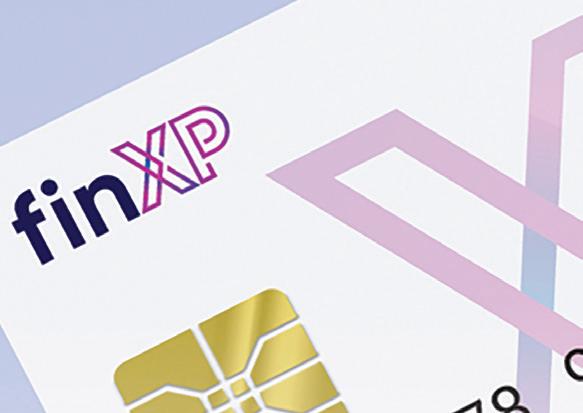

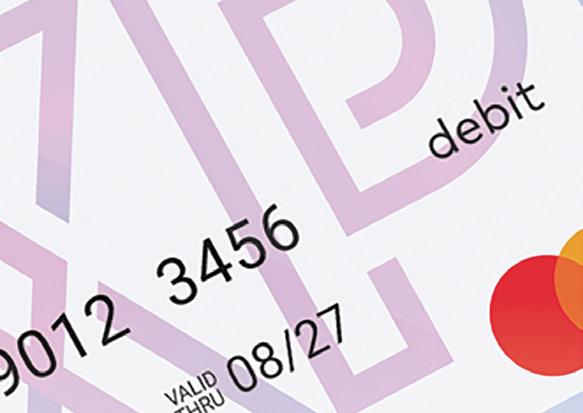





FinXP is a dynamic fintech company specialising in best-in-class payments and banking solutions, particularly focused on carefully serving regulated markets such as iGaming, Digital Assets and Fintech among others.
Founded in 2014, FinXP is licensed as an electronic money institution by the Malta Financial Services Authority, with its licence valid across the EU and EEA.
At the heart of FinXP’s offerings is IBAN4U, a dedicated Euro IBAN Account that empowers merchants to seamlessly make and receive SEPA payments including instant payments and direct debits. By supporting a variety of account-to-account payment types, the IBAN account solution caters to diverse needs such as recurring payments and mass payouts.
But that’s not all. IBAN4U extends its capabilities beyond SEPA, enabling B2B and B2C cross-border payouts to over 100 countries.
Furthermore, complementing these accounts are Mastercard debit cards issued by FinXP, providing users with easy access to their funds on the go. These cards are versatile, serving as employee expense cards or cards for VIP players, all manageable via a mobile app that offers features like transaction tracking, card freezing, setting transaction limits and more.
FinXP distinguishes itself by blending deep technological expertise with extensive nancial services experience.
This synergy allows us to offer not only ready-made services, but also bespoke solutions tailored to the unique needs of our enterprise clients. Oftentimes, for businesses with turnovers in the eight or nine- gure range, customisation is key –whether it involves integrations, portals, branded cards or new product features. Our skilled in-house development team is dedicated to crafting these custom solutions.
One standout example is our closed-loop payment solution. This system enables platform companies and their users to open IBAN accounts with FinXP, fostering a unified banking ecosystem. This setup ensures fast, cross-border transactions with high approval rates, benefiting operators, exchanges, and marketplaces where users frequently need to deposit and/or withdraw funds. To enhance the user experience, we can customise certain aspects, such as the onboarding process for end users.
At FinXP, we are committed to delivering innovative, flexible and reliable payments solutions, continually evolving to meet the demands of our clients and their markets.
FinXP recently announced the launch of a groundbreaking cross-border payments service designed to offer a faster, more transparent, and more a ordable alternative to traditional SWIFT transfers. Leveraging various payout channels – such as bank transfers, card payouts and digital wallets –this service is poised to revolutionise global transactions for many businesses.
In today’s increasingly borderless world, making payments to service providers,

employees, partners and customers worldwide has become a daily necessity. According to Mastercard’s Borderless Payments Report 2022, 47% of small businesses are conducting more international business than before the Covid-19 pandemic. However, the current process for international payments is often slow, costly, and unpredictable – challenges FinXP aims to eliminate.
The B2B cross-border payments market was worth $44trn in 2023, highlighting the immense scale and potential for improvement in this sector. Long and unpredictable processing times remain significant issues for businesses operating globally. FinXP’s new service strives to make international transfers as seamless as domestic ones.
Our innovative solution will enable iGaming operators, affiliates and service providers to execute secure payments to over 100 countries in more than 60 currencies. Notably, we can facilitate real-time, account-to-account transfers to more than 50 countries, ensuring that transactions are executed efficiently. Supported currencies include USD, GBP, NOK, TRY, BRL and many others, offering broad flexibility for global operations. This service will be available at a fraction of the cost of equivalent SWIFT transfers. This is set to be a game-changer for many operators, allowing them to offer superior payout terms to their affiliates and players abroad.
To connect with FinXP, the best method is through the contact form on our website at www. nxp.com. We look forward to helping you streamline your international payment processes.









Dedicated Euro IBAN Accounts




Pay-out to 100+ Countries Globally
Issue Debit & Prepaid Cards
Funds are 100% Protected Next-Level iGaming Payments












Established in 2014, FinXP is very experienced in serving the iGaming industry, with various Tier 1 operators using our payments and banking solutions.










































































Gambling Insider’s Ciarán McLoughlin runs through the latest developments with affordability checks in the UK, with help from some legal experts
The UK White Paper was released last April, with recommendations for the UK Government’s reform of gambling regulation set out. Since the publication of the White Paper, the Gambling Commission has consulted on a number of issues, such as gambling management tools, socially responsible incentives, direct marketing consents, online game design and financial risk checks.
During the consultation process, the Commission addressed some common misconceptions surrounding proposed financial risk checks, aiming to ensure that individuals are protected from gambling
harm, but at the same time respecting the freedom of adults to engage in gambling activities responsibly.
In February, the Commission outlined the next steps for financial risk checks and at the start of May it announced what this would entail. The new rules covered a variety of areas, such as reducing the intensity and increasing consumer understanding of online products, options for direct marketing, age verification and personal management licenses, as well as affordability checks.
Rules set out by the Commission are to be implemented in four stages until completion in February 2025, while Betting
and Gaming Council (BGC) rulings, which have been jointly written with the UK regulator, is a voluntary financial assessment scheme. These set of rules have been created ahead of the implementation of the UK Government’s White Paper.
The BGC’s new voluntary industry code on Customer Checks is aimed at reducing the need to request private financial documents and one of the guidelines includes conducting risk assessments on those wishing to make rolling net deposits of £5,000+ ($6,390) monthly (£2,500+for those aged 18-24), and those wishing to deposit £25,000+ annually.
In relation to the Commission’s rules surrounding affordability checks, these looked specifically at financial vulnerability checks and financial risk assessments. On top of the changes, a pilot of frictionless financial risk assessments was announced, which is set to last around six months, aiming to prevent cases where customers can spend large amounts in a short time period without any checks. Customers will not be affected during the pilot to ensure the Commission can refine the data-sharing processes before assessments are rolled out live, with data coming from gambling companies and credit reference agencies. The enhanced financial risk assessments will only be introduced if the pilot proves they can be conducted in a frictionless way. The light-touch financial vulnerability checks look at identifying financially vulnerable online customers and supporting those who are subject to bankruptcy orders, or those with a history of unpaid debts.
These checks will rely on publicly available data and apply to those customers with a net deposit of more than £150 a month on gambling. Checks will initially come in at £500 a month from 30 August 2024, before being reduced to £150 a month from 28 February 2025.
The checks must be a public record information check and no further check will be required if one has previously been completed within 12 months. In a media briefing after this announcement from the Commission, which included Executive Director Tim Miller and Chief Executive Andrew Rhodes, there was confidence that these checks will be relatively easy to implement for most operators and, for some, may only require a few small changes.
Richard Williams, Partner at Keystone Law and Tamsin Blow, a partner at CMS, have given their insights into these latest updates on the affordability checks, looking at the impact it may have on players, operators and the industry as a whole.
How will these new rules related to a ordability checks impact operators?
Of course, affordability checks will have some effect on the operators who will implement them and Williams has emphasised the di erence between the two: “So-called ‘light-touch’ nancial vulnerability checks will not impact operators a great deal, as many will already be undertaking these checks for risk ags.
“Those that are not will need to incur
























“I expect that there will be some humps and that this will not be plain sailing, but that is the reason for it to be a pilot” - Richard Williams
extra expense and will need to modify their procedures so that they can take proportionate action where a risk is flagged – this does not mean closing accounts in all cases. Costings should not be significant for these checks and I expect them to be frictionless. Financial risk assessments with data sharing are a different matter, and it’s not known yetif these will work and will be frictionless.”
Blow offered her take on the checks: “The new financial vulnerability check provides some measure of clarity for operators as regards the appropriate financial threshold for vulnerability checks. However, the impact on operators is limited because the new Social Responsibility Code provision:
· Does not provide clarity as to the steps that need to be taken by an operator in response to the results of the vulnerability check.
· Does not replace any existing legal or regulatory duties. This means that operators also still have to comply with existing SRC 3.4.3 on customer interaction as well as licence conditions related to AML. The threshold for the financial vulnerability check is based on customer spend but under the existing
SRC 3.4.3 operators also have to consider other potential indicators of harm: patterns of spend, time spent, gambling behaviour, customer led contact, use of gambling management tools and account indicators.
· Limits the financial vulnerability check to publicly available information, but operators must consider this together with all the other information they know about the customer and are permitted to use.
Do you think the pilot will prove to be effective going forward?
On the topic of the nancial risk assessment pilot, Williams stated: “It will cover the largest gambling operators and volunteers who wish to participate. This will not be in a live environment. I expect that there will be some humps and that this will not be plain sailing, but that is the reason for it to be a pilot. Whether these checks can be frictionless remains to be seen.”
Blow added: “During the course of the pilot the Gambling Commission’s intention is that it will have no direct impact on customer journeys. The






thresholds at which the financial risk assessments are to be carried out are yet to be determined by the GC and may be refined during the course of the pilot, so it is difficult to say how effective the output will be.









“It is also not clear the extent to which financial risk assessments will replace existing obligations. A key challenge for the GC moving on from the pilot is that it has committed that mandated financial risk assessments will be entirely frictionless; and will only be introduced if the pilot proves they can be done in a frictionless manner, based on data-sharing.”


How important will these a ordability checks be in ensuring operators protect customers?






are set to bring in: “Financial vulnerability checks will ensure that even at a low level of losses (£150 per month from Feb 2025), customers will be flagged for issues such as bankruptcy, CCJs or other financial risk markers. These are only public records but are the sort of checks you’d expect somebody o ering you finance to undertake.
“They are obviously not conclusive, because a person without these risks can still lose a significant amount of money gambling. Financial risk assessments with data sharing, including items such as mortgage or loan arrears (prior to any formal action having been taken) will be much more thorough.”


A key part of these new rules from the Gambling Commission is related to increasing the safety of customers, and Williams has underlined what these checks



Blow highlighted the importance of the affordability checks for protecting customers: “Prior to the new vulnerability checks, operators were already subject to significant requirements to identify and take action to reduce the risk of harm to vulnerable customers. These new checks should help ensure greater consistency across the industry in respect of a key threshold for protecting customers.”
Do you think players being driven to the black market is a realistic threat as a result of these checks?
There have been some fears that introducing these measures will lead to players being driven to the black market, but this has been disputed by Williams: “There is a good argument that tightening of AML and social responsibility measures has already led to a lot of customers migrating to the black market. Many large spending gamblers (including those with a gambling problem) will already be gambling with black-market operators, many using crypto and connecting via a VPN. I therefore don’t think these measures will have much impact, as the migration has already taken place.”
Blow also doesn’t believe there will be too much of a threat: “The new financial vulnerability checks are an overlay to existing social responsibility requirements, and for the majority of operators we don’t expect it will result in a significant lowering of initial thresholds driving customers to the black market. It may impact small operators (and therefore customers) at the fringes – where they have a licence but
were still using high thresholds that the GC could have found to be uncompliant under the old rules.”
Can you see the UK payments industry in gambling changing dramatically as a result of the a ordability checks?
Looking ahead on if the industry may change much as a result, Williams said: “No not really, although there will obviously be more opportunity to ‘turn o ’ customer spending whenever nancial vulnerability is agged and the operator feels it is necessary to take the proportionate step of closing the customer’s account.”
Blow concluded: “Given the focused nature of the new condition on financial vulnerability checks, I would not expect it to have a dramatic impact on the payments industry. The outcome of the pilot may have a bigger impact, but that depends on its scope.”
Prior to print of this magazine, Gambling Insider was invited to attend the CMS Gambling Conference 2024 (as seen in the images below), led by CMS partner and Head of Gambling David Zeffman. The conference was attended by a variety of UK gambling executives, who heard from a panel featuring insight from Gambling Commission CEO Andrew Rhodes, Betfred CEO Joanne Whittaker,










“These new checks should help ensure greater consistency across the industry in respect of a key threshold for protecting customers”Tamsin Blow
Tamsin Blow, Partner, CMS
Evoke (formerly 888) CEO Per Widerström and ex-Sky Bet CEO Richard Flint.
Within the one hour and thirty-minute session, attendees heard from Rhodes in a one-on-one about his time in the Commission, as he reflected on the many changes within the industry in his short time at the regulator. Rhodes was then joined by Whittaker, Widerström and Flint on stage to answer questions on the big issues currently present in the UK sector.











Given the conference was right in the middle of a General Election campaign, the timing seemed almost perfect; but the main talking points surrounded the UK regulatory framework, affordability checks, growth opportunities within gambling and much more. Overall, the event underlined the growing positive relationship between the Commission and the industry, but emphasised that going forward collaboration and communication will be key.
















































Zak Cutler , President of Global Gaming at Paysafe, discusses connecting operators to all the ways players pay via the single-integration Paysafe Gateway















In 2024, online bettors’ payment preferences have never been more diverse – encompassing cards, alternative payment methods (APMs) and local payment methods (LPMs) available only in a particular market. With the strong correlation between payments and player acquisition and retention, bettors’ transactional experience at the cashier can make or break an operator – and the single-integration Paysafe Gateway was built to make iGaming brands last.
When choosing an online sportsbook, players prioritise streamlined payouts above all other factors, including brand trust, good odds, promotions, user experience, sports markets, team sponsorships and brand ambassadors, according to Paysafe’s 2024 global iGaming research. Other payment factors such as seamless deposits and the availability of preferred payment methods are almost as important in customer conversion, with players






prioritising these over everything else except whether they trust a brand and its odds.
If payments are crucial in acquiring new customers for iGaming brands, the relationship doesn’t end there. A strong and reliable payment experience will maximise customer lifetime values and reduce churn. Paysafe’s research indicates that 78% of global players consider the transactional experience an important factor in why they stay to play with a brand.
And when the payment experience goes wrong? A single bad payment experience will make 72% of global players consider leaving an iGaming brand for a competitor.
It’s essential for operators’ cashiers to feature payment methods supporting fast payouts and deposits, but the broader takeaway from our research is the need for operators to o er payment choice at their cashiers. With 26% of bettors choosing a brand based on whether they offer their go-to payment method, operators should ensure they’re satisfying customers preferences.
And their preferences are diverse. Cards remain very popular, with 38% of global players Paysafe surveyed saying debit cards are one of their top three payment preferences. Even with major markets like the UK and US states like Massachusetts restricting credit cards for online gambling, 25% of all global bettors still prefer wagering with one, trending as high as 30% in Canada’s Ontario and 47% in France.
But operators cannot rely solely on cards. APMs and especially digital and mobile wallets are increasingly popular, with 37% of global players listing a wallet like our Skrill and NETELLER solutions as a top payment preference and 28% favouring a mobile-focused wallet like Apple Pay.
Other APMs are also in demand. A quarter of players (25%) prefer funding wagers via direct bank transfer using open banking while, though niche, online cash products like our paysafecard and Paysafecash solutions are a preference of 13%, trending higher in the US and Germany (both 16%). And when discussing individual markets, payments localisation is a key part of the conversation. LPMs with high brand loyalty locally like Venmo in the US and Interac e-Transfer in Canada are essential options in both markets, where 17% of players consider these a preference.
The unprecedented diversity of how players like to fund wagers and their prioritisation of transactional speed plus security can leave operators feeling daunted when it comes to strengthening their cashiers. To save operators having to integrate an almost inexhaustible range of payment methods, we o er a simple solution in our Paysafe Gateway.
Through a single, streamlined integration, the Paysafe Gateway connects operators’ cashiers to all the payment options a player would ever need. This includes card payments, with all transactions processed in seconds, as well as our suite of APMs – from Skrill, which supports instant deposits and unprecedented payout speeds, NETELLER, paysafecard and Paysafecash to our Pay by Bank solution. This new product enables US bettors to fund real-time wagers by logging-in to their bank accounts right at the cashier.
The Paysafe Gateway complements our own solutions with connectivity to third-party products, including digital and mobile wallets, major LPMs, warrantied ACH solutions and other APMs.
Built on our 25+ years’ experience, the Paysafe Gateway enables iGaming operators to maximise their player acquisition and retention and therefore growth through payments. Through the simplicity of a single integration, operators can skilfully negotiate the complexity of today’s payment ecosystem while simultaneously evolving their cashiers for an even more diverse tomorrow.



















With contributions from BitStarz, Gamblineers, Finix, Payhound and FinteqHub, Gambling Insider Staff Writer Beth Turner investigates the history of crypto gambling, the pros and cons of its use and why so many operators are integrating it into their platforms
Bitcoin was launched in 2009, in the wake of the 2008 financial crisis. Created by an entity known only as ‘Satoshi Nakamoto,’ Bitcoin’s whitepaper described the currency as a ‘peer-to-peer electronic cash system,’ removed from the big banks and corporations that had proven themselves to be unreliable in their handling of people’s finances.
As the first cryptocurrency, the concept of Bitcoin in its early days was somewhat novel. Bitcoin was bought and sold among small circles of investors and internet users, with the anonymity of wallet addresses and global capabilities of the blockchain making it an ideal alternative for those disenfranchised with big banks. It also made it ideal for the black market sale of drugs on the internet... but that’s another story.
Bitcoin is built on the Bitcoin blockchain. When buying or selling with Bitcoin, the transaction is listed on that blockchain, unable to be altered, deleted or changed. To verify these transactions, crypto miners will use computers to complete mathematical verification sums. These validate the transaction, with the machine to validate the transaction first and affix it to the blockchain, as part of a block of data, receiving a small amount of the currency, called a mining reward.
Around 2013, Bitcoin began picking up steam, with its value hitting triple digits. It hit quadruple digits in 2017 and from there grew rapidly, exploding in value in 2021, when Bitcoin rose to a peak worth of over $61,000 in March. This was outdone in November when prices reached over $64,000, with the Bitcoin all-time high (ATH) price as of writing sitting just shy of $71,500, as reported in March 2024. (At press time, its current value sits at around $52,000.)
It is generally understood in the crypto market that where Bitcoin goes, the market follows. Altcoins describe any cryptocurrency that is not Bitcoin and include stablecoins (coins whose value is based on a fiat currency, such as the US dollar), meme coins (see the Elon Musk favourite Dogecoin and Shiba Inu) and utility coins, which includes the market’s second-highest traded coin,
Ethereum. These coins are often built on their own blockchains, or may be designed on an existing blockchain, with examples including Shiba Inu being built on the Ethereum blockchain.
With Bitcoin’s explosion at the start of the decade, more and more businesses across sectors have begun to see the potential of crypto as an alternative payment method for their business. The gaming industry, specifically, has taken particular note, giving rise to the growing trend of crypto integration across the market.
One of the primary ways that crypto has been utilised in the gaming industry is through crypto casinos. Much like any other online casino, a crypto casino will offer a host of online games that may include slots or virtual table games, though, instead of betting with fiat currency, they are simply made through crypto.
The level of crypto functionality on each casino will differ. Some may only offer a wallet-linking system for bets to be deposited, while others may provide a more extensive crypto exchange, where currencies can be bought, sold and swapped on-site. Some crypto casinos may also offer an in-house currency for exclusive use on their platform, which may come with certain player benefits to encourage its use.
Crypto sportsbooks function similarly to crypto casinos, using cryptocurrency to make bets on sports. There are several notable sportsbooks that fit this definition, including Stake, which recently became the primary sponsor of the former Alfa Romeo F1 team, changing its name to Stake F1 Team Kick Sauber. However, to state that all crypto casinos and sportsbooks are a 1:1 reflection of traditional online gaming sites – and that they always have been – would be false...
Online gambling has existed since the early 1990s. As Finix CEO and Co-Founder Richie Serna tells Gambling Insider: “Back in the late
“It is fair to say that the early crypto gamblers in our casino were most likely into crypto as investors more than anything... But that has clearly changed as it has gained popularity in the mainstream”
BitStarz OG Olle Dickson
1990s and early 2000s, if you wanted to place a bet online, you were probably using wire transfers and e-wallet payments, not cards.” From the beginning, it seems, online betting operated differently to other industries –Serna points to the 2006 Unlawful Internet Gambling Enforcement Act (UIGEA) as a reason for this in the US; but across the globe, the 2000s existed as a time of routine change and adjustment, as regulation caught up with the new frontier of online gambling.
The earliest crypto casinos and sportsbooks came to being in the early 2010s, combining the still-niche crypto market that had bloomed in the last half-decade with the developing iGaming market. “I think crypto started appearing two or three years after Bitcoin’s conception in 2009,” Adam Gros, Head Affiliate of Gamblineers, tells us. Gros explains how, as seen with the trend in Bitcoin value, cryptocurrency was still relatively niche and confined to small groups until the mid 2010s, though “by 2014, Bitcoin definitely became a thing in online casinos and bookmakers. From that point on, its large adoption in the gaming market began.”
Crypto casinos are not necessarily just carbon copies of other iGaming platforms, accepting crypto payments to play on various digital slots. This was especially so among the earliest crypto casinos, which Gros describes as “one-game websites accepting Bitcoin.” “It all started with dice games developed by crypto and technology enthusiasts. These were one-man-band websites with no features as we know in casinos today (no support, no promotions, only one game). One such example is SatoshiDice, which still exists!”
Indeed, many will suggest that SatoshiDice, launched in 2012, was one of the first crypto ‘casinos,’ with other early entrants to the market including BitStarz. BitStarz OG Olle Dickson tells Gambling Insider : “You could put the early crypto casinos into two categories. You had the casinos that derived from traditional fiat casinos who looked and operated like your standard casino... Then, you had the casinos that started to focus more on very simple, scaled-down games, like plinko, crash etc, wanting to move away from the traditional casino label.”
In this early period, crypto was niche, but provided a workaround for placing online bets when laws and regulations may have made it challenging or impossible for traditional payments processors to operate. As was the case in the US, Serna explains: “When UIGEA was passed in 2006, it didn’t ban online gambling outright, it just made it illegal for financial institutions to knowingly process payments for illegal online gambling... It became harder for players to fund their accounts, expensive for gambling operators to process payments and many payment processors pulled out of
the US altogether. This pushed the remaining players to use alternative payment methods like prepaid cards, cryptocurrencies, bank transfers and more specialised payment processing solutions.”
have enhanced the ease of anonymous transactions, it is not a fundamentally new concept in the context of payment methods and anti-money laundering (AML) practices.
the right screening and transaction monitoring tools.
As crypto’s popularity began to skyrocket at the start of the latest decade, crypto has become more present and popular among players. Payhound Managing Director Elton Dimech points to crypto gaining popularity in iGaming for two primary reasons: “Firstly, operators can easily accept player deposits in crypto by integrating an API. Secondly, companies have been using crypto to pay B2B fees and commissions instantly around the globe. Given the iGaming industry’s strong connections to the crypto world, we can expect more expansion from here.”
“To ensure these systems operate within legal frameworks, several measures are
in place. First, crypto-processing systems like CoinsPaid conduct blockchain analysis to track the origins and sources of funds, categorising the associated risks. Second, AML teams request documents when they identify suspicious factors... Additionally, in crypto by integrating an API. Secondly,
New online casinos may launch offering fiat and crypto payments off the bat, while others may choose to integrate crypto payment methods onto a pre-existing platform. The days of single-game ‘casinos’ are, for the most part, behind us. But with this newfound popularity comes a wave of questions – questions that are key to understand, given cryptocurrencies’ general technicalities.




When writing this article, a major thought I had regarding crypto casinos and crypto sportsbooks was the legality of it all. Speci cally, how can these businesses assure bets are coming from legitimate sources, when crypto is global and anonymous?











“At the end of this year, we are expecting the enforcement of a new upcoming legislation that will help widespread adoption of crypto across EU member states. This new regulation called Markets in Crypto Assets (MiCA), together with the newly introduced Travel Rule, will allow companies to have better access to information for a better AML landscape. “


Many will describe crypto as being a faster and cheaper solution to transactions using traditional banks.



























Blockchain wallet addresses are pseudoanonymous. The address can be used to prove activity from a wallet, but the individual’s name or details are not connected to it. The decentralised nature of the blockchain also makes the location of transactions challenging to ascertain, hence why it was so popular with illegal product vendors during its early years.

So, when each country around the world has different laws and regulations on gambling, with some countries having a complete blanket ban on gambling, how are platforms able to ensure they are accepting bets placed legally?
AML protocols for cryptocurrencies involve monitoring transactions from different sources. For example, a deposit from one address and a withdrawal to another.
Fast transactions are a crucial need for online gamblers, Serna explains, noting that “Instant withdrawals and payouts are something people have come to expect in online gambling. This sometimes means supporting alternative payment methods like e-wallets, prepaid cards or cryptocurrencies.” For crypto, Gros states, “faster transactions and very low fees are a consequence of no third-party intermediaries such as banks and credit card companies.” While this may be true for some currencies, depending on their usage and validation speed, for some cryptocurrencies like Bitcoin, this may not be the case.



others may choose to integrate crypto a need prepaid to concept gas blockchain must this Depending is, to to of like time,
Gambling Insider put this question to FinteqHub CEO Vadim Drozd. He explains: “Anonymity in payments is not exclusive to cryptocurrencies. Voucher payments and prepaid cards also offer users anonymity, which has long been a feature of the payment industry. While the advent of crypto may
This thorough scrutiny complicates fraudulent operations.”
This thorough scrutiny complicates
Payhound Managing Director Elton Dimech echoes similar ideas, stating: “In Malta there has been a solid regulatory framework in place for years. Crypto payments can be deemed to a certain extent anonymous; however, all crypto asset service providers that are subject to a regulatory regime similar to Malta must adhere to AML obligations which mitigate the anonymity aspect, by implementing

Now is a good time to bring up the concept of gas fees. When making a blockchain transaction, the user typically must pay a gas fee for this transaction. Depending on how busy the network is, these prices can go up, with those willing to pay a higher gas fee able to skip a portion of the wait time. This means for blockchains like Bitcoin, transactions can take a long time, or alternatively, be quite pricey.









important to note. When a transaction is validated, to There the is of-work. engage system, to the
How these transactions occur is also important to note. When a transaction is validated, the machine to add the transaction to the blockchain must do so with proof. There are many proofing methods; however, the one used by Bitcoin is known as proofof-work. With this system, any computer can engage with the proofing system, though to receive the mining reward, typically only the best machines win. This means a lot of wasted energy from other machines, alongside the high energy use needed to run a high-tech mining computer.
Naturally, this is not the most eco-friendly solution, with some estimating that Bitcoin mining uses more energy than some small countries annually. The wider altcoin market has been working to alleviate this issue as much as possible, it must be noted. In September 2022, Ethereum completed what was known as ‘The Merge,’ migrating
“The most popular cryptocurrencies used in casinos are the ones with the highest market cap simply due to the fact that a higher market cap usually correlates with the highest number of people owning that coin”
Gamblineers Head Affiliate Adam Gros
from the aforementioned proof-of-work validation system to a proof-of-stake system; a system that was quicker, more scalable and operating using over 99% less energy. Even so, each Ethereum transaction still uses as much energy as it takes to fully charge an iPhone 13... three times.
Other altcoins, such as Solana, operate on even less energy, with each Solana transaction using less kilojoules than a Google search. These solutions are better, undoubtedly, yet Bitcoin is still the cryptocurrency with the highest market capitalisation by far, with a market cap 2.8x larger than Ethereum and Solana’s combined. But, if people are gambling with crypto, there’s a good chance they’re gambling with Bitcoin.
“The most popular cryptocurrencies used in casinos are the ones with the highest market cap simply due to the fact that a higher market cap usually correlates with the highest number of people owning that coin,” says Gros, while Dimech adds: “It is estimated that 80% of crypto transactions are made using the 2-3 most popular coins, so it is understandable that operators interested in offering crypto as a payment option should offer these coins for ease of access for players.”
Navigating this energy use, the associated
similar sentiment, noting that FinteqHub crypto provider, Coinspaid, uses various mechanisms to aid in transaction cost and speed optimisation. He adds: “Operators often absorb the increased costs of crypto transfers, ensuring that players do not experience the higher fees typically associated with such transactions. Essentially, the operator pays extra to expedite payments.”
Finally, there is price volatility. As any crypto investor will tell you, the price of most non-stablecoins can fluctuate rapidly, with some coins such as meme coins being particularly volatile. Buying when prices are low (otherwise known as ‘buying the dip’) and selling when they are high again is a key to crypto trading; however, for those just wanting to use crypto to make bets, this volatility could result in a player paying more or earning less than expected due to the very quick price changes.
We ask Drozd how crypto payment solutions ensure the value of a $5 bet remains solid during volatile periods: “The value of a bet is secured through hedging mechanisms. When a player deposits any cryptocurrency, such as Bitcoin, and chooses to play with fiat money, crypto payment providers hedge this deposit based on the current exchange rate. This ensures that, at the time of withdrawal, we have the necessary liquidity to match the player’s fiat balance.... However, if the player opts to exchange between
cryptocurrencies, such as Bitcoin and USDT, we employ the same

hedging strategy as we do with fiat currencies to manage and secure the funds.”
Dickson adds: “There are a few things to bear in mind with cryptocurrencies and that is that volatility varies a lot between them. Some coins have extreme volatility and some rather mild (within the realm of crypto volatility of course). There are, however, stablecoins that eliminate the volatility problem altogether, such as USDT. At BitStarz, you also have the opportunity to instantly convert the crypto amount to a fiat currency upon deposit, in case you’re worried about the swings in price.”
Aside from using stablecoins and relying on fiat conversions to curve price volatility, one solution to the challenge of market volatility and transaction prices is the use of an in-house currency. Some crypto casinos and sportsbooks may offer a currency for use exclusively on the site, which can typically be purchased on the platform with both fiat and other cryptocurrencies.
As Gros outlines, “There are two challenges involved with cryptocurrency for operators: Crypto volatility and in the case of smaller crypto tokens, their support by game providers. While crypto players want to deposit and withdraw cryptocurrency, they mostly still want to play with the display currency of Dollars or Euros. Most bet limits and promotions are also carried out in fiat currencies, which means constant conversions and keeping track of the live crypto market prices. By converting all deposits to in-house currency, you do the conversion only once. After that, everything is simple because internal currencies can have a fixed value. This also means players can play all games with any cryptocurrency, even if that cryptocurrency otherwise isn’t supported by game providers.”
However, in-house currencies may not be the solution for every operator. As gas price and wait time for Bitcoin transactions is a challenging issue to navigate, Dickson admits. “One of the issues now and again are the fluctuations in price for sending BTC as an example. When that’s the case, we always encourage our players to use another cryptocurrency for the time being. As we accept many, they’re able to pick an alternative such as Litecoin (LTC) and avoid the potential BTC traffic jam.” Although he states that, with the right tools, “it shouldn’t take away from the overall gambling experience.” Drozd echoes a


Drozd notes: “Developing and maintaining
a proprietary token requires significant resources and attention, which can divert focus from the casino’s primary objective of providing entertainment and quality games. Additionally, there are extra costs associated with building player trust and convincing them to adopt and use the internal cryptocurrency, necessitating a substantial marketing budget.”
In the early days of crypto casinos, before Bitcoin hit the ve-digit or even four-digit pricetag, gambling was like any other reason to use Bitcoin. Dickson comments: “It is fair to say that the early crypto gamblers in our casino were most likely into crypto as investors more than anything. We also have to understand that back in the day many places didn’t accept crypto. But that has clearly changed as it has gained popularity in the mainstream now.
“I remember it being very stigmatised early on; people equated crypto to the dark web and Silk Road among other things. Now we see a lot more people realising the benefits of virtually instant peer-to-peer transactions, especially when banking regulation is getting stricter. To give you a concrete gambling-related example, I remember a friend having a hard time getting a mortgage simply because the bank saw gambling transactions on his statement. The benefits of utilising crypto are becoming more and more evident.”
Indeed, it was a rebellion against the big banks that kicked crypto off in the first place, and now it seems that cycle of using crypto as an alternative to typical bank oversight has continued as it has entered the gaming market. So crypto exists and is popular, especially among ever-elusive under 35s. That alone will be enough to convince some operators to integrate crypto payment solutions into their platforms, or
crypto-based services into their offering. But beyond that, as seen above, crypto is not perfect. So why are some people, especially those who are not typical crypto investors, turning to the alternative currency as a payment solution?
Serna tells us: “Gambling operators will often face higher processing fees, cash reserves and volume caps because the compliance and financial risks are higher for this industry than others. These higher fees and risk mitigation techniques can be passed along to consumers, but there’s a constant risk of upsetting customers and driving them to a competitor. Whatever the case may be, each business is unique and there is no one-size-fits-all approach to payments.”
As such, many operators may seek out alternative payment solutions, be it crypto or another payment processing solution. Sarna continues: “To thread the needle between compliance, risk, growth and customer delight, it’s important to find a payments solution that’s dynamic and customisable. Many traditional processors won’t work with gambling businesses and, even if they do, implementing their tools can be a nightmare for developers.”
He points to the fact that some traditional payment processors will “charge high fees for gambling transactions because they see it as a risky industry,” which may in turn force operators to seek out nontraditional options.
Apple Pay and PayPal, for example, are popular payment choices online among players. When we asked why these solutions may be sub-optimal for the gaming industry, Gros responded: “While services like PayPal and Apple Pay are convenient, they usually require you to add your credit card or bank account, which serves as a source for your payments. This means bank and credit card fees are still there (sometimes even additional
“Another factor is anonymity. Obviously, giving away your personal information is unavoidable when using a bank or a credit card, as well as when buying crypto in an exchange. However, after that, paying with crypto doesn’t require giving your personal information to anyone else, which isn’t the case with services like PayPal or Apple Pay.”
It seems, with crypto betting, both operators and players gain access to a freedom not afforded by fiat casinos. In using crypto, they are free of data brokers and others who may use their data when inputting into online casinos, and are also free of the limits imposed by banks. This is the longstanding mindset behind crypto, after all: your money is yours; banks should not be the ones dictating what is done with it.
But it would also be untruthful to say every crypto gambler out there is doing so purely to spite the banks. Bettors play with crypto for the simple reason that playing with crypto is fun.
Crypto is different, exciting and constantly changing. It is a market that has never sat still – something anyone who has spent any time in the online gaming market in the last 30 years can likely relate to. When new technology is accessible, those with an interest will follow. Crypto is just the latest in a line of new technologies and, considering its anonymity and innate rebellion, makes it particularly appealing to younger players seeking something new and exciting.
Yet, beyond the fun of it all, crypto has also come to serve as something of a lifeline for those in financially challenged nations. Bitcoin has become legal tender in El Salvador and the Central African Republic, while in Venezuela, gambling can only be conducted via cryptocurrency. As Dimech puts it: “Crypto transactions

some providers and suppliers to integrate


have no chargebacks and are settled almost instantly. This gives operators a better ability to accept deposits from players and execute payouts in their target markets, particularly in countries with inefficient banking infrastructure.”

fees by the gateways). You’re also limited to how much or how little you can pay and how fast the transactions are, most notably for withdrawals. If a casino implements crypto payments directly on the blockchain, the only fees that are left are the mining fees, which are negligible in most cases. There are also no payment limits except those set by the casino itself, and the transaction speed depends only on the average block time.

While it may serve as an alternative to some, for others it is crucial – putting at least a little more weight behind the argument for continued crypto integration. And, as far as gaming and crypto and concerned, we can definitely conclude the two are coming together.
With a mission to empower companies to deal with cryptocurrency as easily as they deal with at, Payhound is providing payments solutions tailored to the needs of the gambling industry. Originally established in Malta, Payhound has grown to cater to a wide array of clients within the gambling space and beyond, in industries such as Forex, Payment Services and Investment Services.
Payhound empowers gambling operators with the ability to accept player deposits in cryptocurrencies, by seamlessly integrating Payhound’s API into their platforms. This service enables gambling operators to accept deposits and process withdrawals in cryptocurrencies without needing to maintain any crypto balance themselves. Payhound handles all aspects of the conversion, providing a seamless experience for both operators and players. This solution not only simplifies the integration of crypto payments but also enhances the speed and efficiency of financial transactions within the gambling ecosystem.
Payhound’s second core service addresses the complexities of cross-border payments. The company facilitates global settlements, invoice












payments and other nancial transactions between B2B partners, a liates and service providers. This solution is particularly bene cial in the gambling industry, where international partnerships are common and timely payments are crucial for maintaining smooth operations.
For companies looking to manage substantial amounts of cryptocurrency, Payhound o ers large-volume trading services. This specialised o ering is designed for businesses seeking to convert signi cant crypto holdings into fiat or to build crypto exposures on their balance sheets. With the increasing popularity of cryptocurrencies among listed companies, this service is gaining traction as a strategic nancial tool.
Malta has long been the cornerstone of Payhound’s operations. The company developed its own crypto processing solution alongside local gambling regulations, making it one of the rst crypto providers to work with Malta Gaming Authority (MGA) operators. In 2021, Payhound achieved a significant milestone by securing its licence as a Virtual Financial Assets Service Provider licence from the Malta Financial Services Authority (MFSA). As Europe prepares for the Markets in Crypto Assets Regulation (MiCA) at the end of this year, Payhound is ready to expand its presence across all European Union member states. The company emphasises compliance and regulatory adherence as crucial aspects of its strategy, ensuring a smooth transition into the evolving regulatory landscape. Payhound’s journey in Europe reflects its commitment to navigating legal frameworks while facilitating safe crypto transactions for customers.
Beyond Europe, Payhound is witnessing growing interest in cryptocurrencies in Asia and Latin America. In these regions, gambling companies are increasingly adopting crypto as an alternative payment method to overcome banking challenges, such as slow processing times, high fees and currency
controls. The preference for crypto in these markets is also driven by high in ation rates, making digital assets a more stable option for nancial transactions.
Security in the crypto space is paramount and Payhound takes this responsibility seriously. The company guarantees the safety of clients’ funds by adhering to strict security protocols and regulatory requirements. Payhound is ISO 27001 certi ed, a testament to its commitment to information security management. Additionally, the company rigorously follows Anti-Money Laundering (AML) obligations and employs blockchain forensic tools to monitor and secure transactions, ensuring a safe environment for all parties involved.
The potential for crypto payments in the gambling industry is vast and growing. An increasing number of operators are integrating crypto options to attract new, tech-savvy audiences. Some are even establishing crypto-only brands to capitalise on this trend. From a B2B perspective, crypto facilitates instant settlements, enhancing business partnerships and resolving geographical payment challenges. This capability is particularly advantageous for paying commissions or invoices to numerous companies simultaneously.
Moreover, the forthcoming regulatory changes in Europe signal a broader acceptance and interest in crypto usage across various industries, not just gambling. Payhound is at the forefront of this transformation, ready to navigate and leverage the evolving landscape of cryptocurrency regulations and opportunities.
In conclusion, Payhound is changing the way gambling operators handle payments, offering secure and efficient solutions that cater to the unique demands of the industry. As the company continues to expand its market presence and enhance its services, it is well-positioned to lead the charge in the complex field of payments in cryptocurrencies.





Gambling Insider looks at how operators can use payment methods to support an omnichannel strategy... and greater CSR
Payment channels can be a powerful force. They’re how customers withdraw winnings and how operators receive the deposits that get funnelled into revenue. It’s no exaggeration to say all business revolves entirely around the concept, availability and execution of payments. But what if a company decides to use payments and payment technology to support a particular omnichannel strategy?
During research, Gambling Insider came across a curious promotion being run by Flutter Entertainment’s Paddy Power brand: ‘Bet £10 ($12.76) in store, get £10 in free bets online’. It seems simple enough, but the concept has potential far beyond a simple marketing strategy promoting the operator’s omni-channel offerings.Sure, it can be a way to introduce retail-only punters to the wonders of iGaming, but what if there was an emphasis on the reverse? In a world of online casinos, what if operators used this popularity to support a range of options?
SAVING THE HIGH STREET
It’s no secret that the UK high street has been struggling over the past decade or so. You only need to go into your local town centre to see plenty of shops boarded up and shuttered. It was already a problem

before the Covid-19 pandemic, but retail numbers have plummeted across every industry since then. According to the O ce for National Statistics, in June 2009 internet sales accounted for 5.6% of all sales; In March 2024, they accounted for 25.4%. While this is strictly for standard shops, the gambling industry has seen an even more drastic scaling over the years. In 2009, retail gambling made up 58.3% of industry gross gaming yield (GGY), while online casinos only brought in 0.4%! By February 2024, the numbers had practically ipped, with 59% of total GGY being now attributed to remote casino, betting and bingo operators. However, this is where we introduce the Paddy Power offer: ‘Bet £10 in-store, get £10 in free bets online.’ The majority of customers are already online, so who is this offer actually marketed towards? Is it aimed towards the older generation, who are yet to make the jump to online sports betting, or is it a philanthropic gesture destined to save the retail staff in the Paddy Power bookies? Unfortunately, we’ll never know, because Paddy Power did not respond to us for comment on this feature.
A promotion encouraging customers to use a particular aspect of the company isn’t groundbreaking. However, this particular promotion is already seeing results. In its

FY2023, Paddy Power reported that its retail sportsbook revenue grew by 12.4% and its retail gaming revenue grew by 8.1% – making it one of the few operators who could actually report that its retail stores were doing positively. Paddy Power is aware of this, too, as it commented that this growth was due to ‘product enhancements introduced during 2022 and 2023’ developed specifically for retail stores. Even though Paddy Power retail stores only brought in $374m in the UK and Ireland, while online brought in $2.67bn, the brand was refusing to hang them out to dry.
This begs the question, though, as to whether this could work with other operators. And, quite frankly, there’s no reason it couldn’t. Sports betting is very simple in this regard; a bettor creates a slip worth £10 in-store, and then they get credited a further £10 to use with their online account. It could get complicated in a casino, with different chips and games and the like, but in a bookies this concept is easily attainable. A simple offer like this would encourage players to use their local bookies, which would in turn keep more shops open and more people employed. Payments wise, this adds value to keeping traditional options on board: such as card and cash.


What if this concept could be taken even further? What if payment technology could directly contribute to a good cause? This has been a concept intrinsically linked with the British gambling scene for centuries; Gambling Insider has previously covered how the UK National Lottery has been used to fund various causes since its inception, which has evolved into a number of charitable avenues nowadays. And yet there’s no reason for this to be limited to state-funded lotteries. Whether you support her or not, Red Tiger launched its Carol Baskin-themed slot ‘Big Cat Rescue MegaWays’ on 19 May 2022, where a portion of the proceeds goes to the sanctuary and education centre. This means that every spin can directly support the treatment and rehabilitation of tigers, cheetahs, lions and other feisty felines, with the tagline for the slot even saying, “Your play saves big cats.” Not only is this level of corporate social responsibility (CSR) infrequent within the industry, it’s also giving players the autonomy to decide which charity they’re supporting. Rather than simply donating a portion of revenue at the end of the year to a charity of the company’s choosing, the players themselves are involved in the process.






Another interesting case study is Golden Heart Games (GHG). GHG is a sweepstakes casino operator in North America. Sweepstakes are in essence a free-to-play casino where players can redeem real-world prizes if they get their hands on premium currency within a game, but players never wager anything of real value. It’s the kind of casino where you get 2,000 more gold coins every 20 minutes to play with. However, this operator also directly gives to charity. Players have the option to purchase more gold coins, and 1% of these purchases will be donated to a charity of their choice. Since its launch, Golden Hearts Games has given over $10m to charity. While these might have found success in the US, there’s no reason this couldn’t take off just as well in Europe.

a few peripheral features, such as the physical tip jar. Thankfully, it would be relatively easy for payments technology to reintroduce this. After all, several fast-food and retail outlets have been doing it for years, so why is the gambling industry trailing behind in terms of CSR?

to charity. Players have the option to





















betting and gambling is now done online.
Back in the good old days, there would be a tip jar on the side of the casino or bookie cashdesk, where you could drop a few spare pennies when you withdrew your winnings and know you were contributing towards something good. However, the majority of betting and gambling is now done online. While this is certainly more accessible and convenient for people, this does remove










OKTO stands as a beacon of innovation in the gaming payment industry, o ering bespoke solutions tailored to the unique needs of retail, online and omnichannel businesses. Founded on principles of operational excellence and adaptability, OKTO has emerged as a trusted leader, specialising in the complex last-mile journey of payments within the gaming sector.
At the heart of OKTO lies its unified payment platform, a versatile tool designed to cater to the diverse payment needs of gaming businesses worldwide. OKTO addresses challenges head-on via advanced payment services, from cashless gaming solutions, eWallet for igaming as well as advanced eVoucher cash-based methods and beyond, to payment orchestration, local payment methods and cross-border services.
The company’s resilience in the face of industry challenges has been remarkable. Navigating through evolving market dynamics, integrating with legacy systems and adhering to stringent regulatory frameworks are just some of the obstacles OKTO has proficiently overcome. By embracing change and staying agile, OKTO consistently delivers innovative solutions that not only meet but exceed industry standards, earning it a reputation as the go-to partner for gaming payment solutions.
A key innovation is the company’s payment orchestration service, which revolutionises transaction management for businesses. This service streamlines payment processes by consolidating multiple providers into a unified platform, unlocking numerous local payment methods, ensuring seamless transaction flows, and optimising performance via smart routing. OKTO’s payment orchestration offers enhanced flexibility, allowing merchants to choose from various payment methods
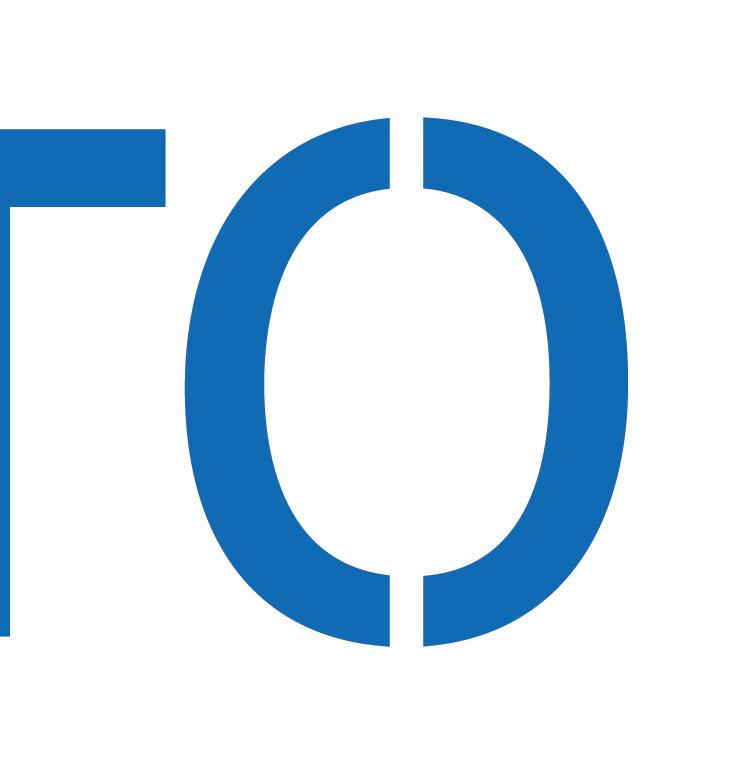
tailored to their specific requirements. This adaptability empowers merchants to cater to diverse customer preferences, driving higher conversion rates and customer satisfaction.
Tailored per-region-solutions are another innovative approach of OKTO. Specialised solutions for Brazil, such as PIX Direct and Pay And Play, cater to regional demands, prioritizing speed, security and cost-efficiency.
In addition, for iGaming, OKTO offers comprehensive solutions through its cash-based eVoucher service OKTO.CASH and its advanced OKTO.WALLET linked with an OKTO Visa Card, meeting all the demands of modern igaming consumers for instant pay-ins and payouts.
Similarly, for retail, the payment provider strives to simplify the payments ecosystem by creating cashless payment options tailored to each operator’s demands, whether it’s OKTO.WALLET, the company’s advanced wallet solution, a white-label wallet, or a quick and direct payment journey facilitated by the innovative retail payment gateway, OKTO.DIRECT.
Operators globally partner with OKTO because they recognise the transformative potential of its services. Whether it’s optimising payment processes, enhancing efficiency or unlocking hidden potentials, OKTO’s solutions drive tangible benefits for its operator partners, directly impacting their bottom line.
OKTO’s appeal spans across the gaming spectrum, catering to companies of all sizes and sectors. From online operators seeking frictionless payment methods and services to high-street retailers and casinos expanding their omnichannel and cashless strategies, OKTO’s scalable and customisable services have left an indelible mark on the industry.
In an era when customer experience reigns supreme, OKTO places a premium on making payments seamless and frictionless. Prioritising mobile-first, omnichannel and responsible payments, OKTO aligns with modern user expectations, ensuring flexibility, convenience and security at every touchpoint.
Reliability is the cornerstone of OKTO’s success. The company holds PCI DSS Level 4 Certification and maintains partnerships with major financial institutions, prioritising security and compliance. Its unwavering commitment to security and reliability instills confidence among merchants and consumers alike, cementing its position as a trusted payment provider.
In the realm of responsible gaming, OKTO leads by example. By seamlessly integrating comprehensive KYC and AML measures into its payment services, OKTO enhances responsible gaming efforts and improves customer acquisition, creating a safer and more enjoyable gaming environment for all. OKTO’s unique position stems from its deep understanding of customer needs, partner integrations, and innovative solutions. With a global footprint and a growing user base, OKTO continues to drive digital transformation in payments.
The company’s business growth is evident through its global footprint across the Americas, Europe,and Asia, as well as its expanding user base. With an impressive track record of over €4bn ($4.29bn) in processed volume and over 25 million consumers transacting via the OKTO platform worldwide, OKTO continues to drive digital transformation in payments within the gambling industry and beyond to new verticals.











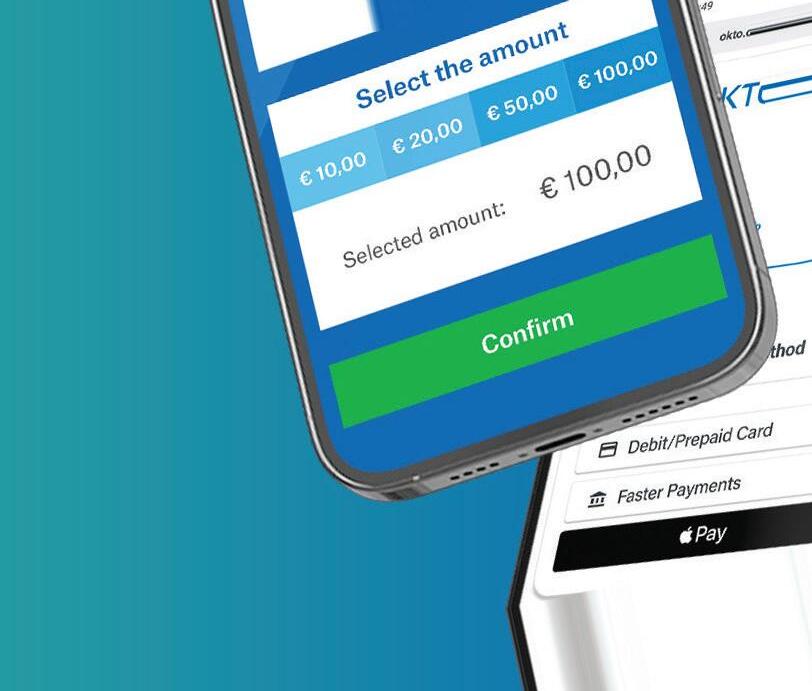
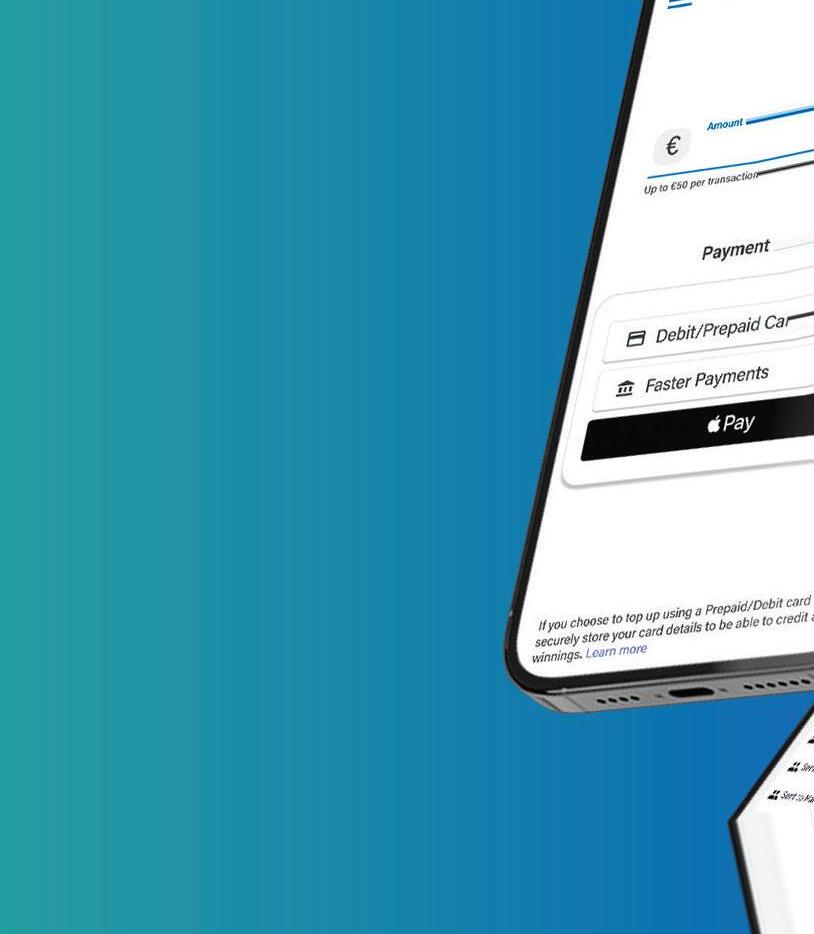




















Gambling Insider’s Megan Elswyth reached out to gambling regulators around the world to gain a better understanding of how different countries are approaching ID checks


Identification checks are nothing new, especially when it comes to gambling. Whether it’s presenting your ID to the bouncers at the door to prove that you’re old enough to enter the establishment, or maybe giving the poker supervisor your name so they can enter you into the tournament, your identity has always been intertwined with the casino experience. Admittedly, though, this was previously done on a more casual basis. If you were clearly old enough, you could usually walk right past the bouncer, and you could probably sit down at a slot machine with no further questions asked. So, what happens when the open-door policy suddenly closes on potential customers, and where do payments come into all of this?
Well, luckily for us, we don’t need to speculate about this too much because it’s been a growing trend internationally. Amid a growing Cost of Living crisis, the Gambling Commission is framing its latest initiatives as a way to protect customers from spending money they might not necessarily be able to afford. This has, understandably, made plenty uncomfortable with the entire process – after all, who wants to send sensitive information to an unknown entity behind a screen? While the Gambling Commission in the UK has recently received pushback on its proposed affordability checks, this level of customer vetting is certainly becoming more common across the board. However, each country does handle it slightly differently. Let’s take a look at how other countries have handled increasingly intense ID checks when it comes to payments and gambling.




















Veikkaus became the rst gaming company in the world to require identi cation in all digital and physical channel games. The Finnish state-owned operator introduced this with lottery games in 2023, but really doubled down and applied it to all verticals this year. We reached out to Veikkaus to try
to understand exactly where it was coming from when it came to enforcing such strict ID checks, and asked why it was so important for Finland to do this.
Susanna Saikkonen, Vice President for Sustainability at Veikkaus, told us: “The most important reason is to advance safer gambling as a whole. Safer gambling at a personal level means the player, for example, can see all of their gaming history and set limits to better control their gaming.” It’s no secret that scratchcards and lottery tickets can easily slip under the radar when it comes to responsible gambling, and this was one of the reasons Saikkonen emphasised when Veikkaus introduced the compulsory checks. The ID creates a profile on the player, where they can track their spending and loss habits themselves. The focus on player autonomy in responsible gambling was a unique angle to approach ID checks from, but it certainly lends itself to a more sustainable market overall. Rather than treating them like a punishment or an invasive procedure, Veikkaus has framed enforcing ID checks as a way for players to self-monitor their behaviour, especially in the ‘softer’ markets, such as lottery products.
In fact, when asked how companies could contribute to this movement, Saikkonen replied: “Just do it! It’s for the benefit of the whole industry to show real actions to advance safer gambling, and ID checks are a concrete way to achieve these improvements.”
Of course, ID checks are a two-way street. The bottom line can never be ignored and Gambling Insider discussed the ID check process with Andria Evripidou, CEO of fiat and crypto banking provider XDA. According to XDA, there are countries with much more stringent ID and KYC check. Germany adopted an electronic identity (eID) card in 2010, known as the Personalausweis, which includes a range of security features, such as digital signatures and encryption. These cards can then be used by German citizens for online banking, e-commerce, and accessing government services.
Meanwhile, XDA explains that Japan has some of the strictest regulations in the world: “Financial institutions must verify their customers’ identities using a combination of document checks and in-person verification. Institutions must also perform enhanced due diligence checks on high-risk customers or transactions. They are also obligated to report any suspicious transactions or activities to the authorities, and are seen as a key contributory role in the detection and prevention of money laundering and terrorist financing.”



The Kansspelautoriteit, or Dutch Gaming Authority (KSA), is due to publish its new set of Responsible Gaming Policy Rules this summer. The majority of the rules will come into effect on 3 June, but there are a handful on the analysis and registration of behaviour that will go live on 1 October. As part of this, customers will be asked to undergo enhanced identity and affordability checks if they deposit more than €700 ($760) in a month, or €300 if the customer is aged between 18-24 years old.
Perhaps the most interesting aspect of the new Responsible Gaming Policy Rules was the timed expectations from the Authority. Rather than assuring that potential harmful behaviours would be flagged, the KSA outlined that “the software or the responsible employee of the license holder must be aware of such a signal or suspicion within an hour,“ meaning that any addictive or problematic behaviours should be signposted within 60 minutes. The KSA explained that “this is in line with the study’s observation that many providers do not monitor ‘real time’ and sometimes notice signals too late, which can cause players to suffer large losses in a short period of time.”
Naturally, then, one of the best ways this can be ensured is by having strict ID checks in the first place. By registering and analysing player data for early identification of possible risky gaming behaviour, a player profile can be built, allowing for tailored responses by gaming officers. This would affect the severity of the response or intervention, by giving those responsible all of the information needed to make decisions immediately – or in this hour outlined by the KSA.
When asked for a comment on this, the KSA told Gambling Insider its priorities with requesting ID checks for players were:
“To be compliant with their duty of care and all that comes with it: for example, to prevent underage gambling, to check with the exclusion register and monitor player behaviour or affordability.”
It’s one thing for companies and authorities to agree with such protective measures, but it’s another thing to actually put these systems into place. With more customers than ever asking why their details are needed just to access an online casino, Evripidou provided a sound explanation of why ID checks are becoming seemingly more intrusive: “As businesses embrace a rapidly evolving digital landscape, so have fraudulent and criminal opportunists. In an effort to combat growing levels of financial fraud and crime, countries are introducing increasingly robust identity verification procedures for online payments and financial transactions. However, new ID verifications aren’t being rolled out consistently. Regulators around the world are taking different approaches when creating and enforcing these ID checks. Often, their methods are a reflection of their regulatory environments, cultural norms and technological advancements.”


XDA also laid out the three main types of ID verification that are commonly used around the world, those being digital identity verification, two-factor authentication and biometrics. These escalate in both security and depth, although alongside this they also require more information from the customer. While it can be easy to pose as someone else online, it’s very difficult to convince a fingerprint scanner or facial recognition software... But when it comes to something like online gambling, how far are customers willing to go before they simply try registering with another casino?
It wasn’t just gambling commissions in Europe that we reached out to discuss this with, though. Even though online gambling isn’t as ingrained in North American culture as it is over here, it’s still important to get a cohesive view of the global changes to ID checks.
When asked what their priorities were, the New Jersey Division of Gaming Enforcement (NJDGE) told Gambling Insider : “Through ID and KYC checks, players are protected from victimisation against illegal gambling operations that, for example, may seek
to use stolen identities to advance their enterprises, and are provided with responsible gaming resources and messaging, as well as other consumer protections. In addition, these checks help to ensure that responsible gaming tools are employed and working correctly. All of these factors serve the most important interest of player protection.”
Of course, if you know anything about gambling in the US, this isn’t a surprising answer. Even though New Jersey was one of the first states to legalise gambling in the modern era, signing the Casino Control Act into law on 2 June 1977, there was still plenty of public discourse about the dangers they could bring. Casinos and gambling as a whole have always had a ‘root of all evil’ stigma to them, so it’s only natural that the NJDGE then reflects this in everything it does, down to the reasons behind the ID checks. The emphasis is on guiding players towards legalised and regulated gambling experiences, where additional protection then can be employed.
It would be obnoxiously obvious to say ID checks in payments and withdrawals related to gambling were for ‘player safety,’






which is why it was so insightful to see how this one procedure reflects the biggest concerns for each country’s gambling commissions. There is an argument that says a country’s morals dictate the laws it upholds, and yet this could not be clearer with the above. The UK is in a cost-of-living crisis, so the ID checks are explained as protecting a customer from overspending; Finland is dissolving its current monopoly system to introduce a licensing model, so its ID checks are a way to support player self-regulation in a time of great change; The Netherlands is tightening laws on gambling, so its ID checks are a way to streamline an appropriate and tailored response; and finally, New Jersey has to uphold the image of casinos being safe and legal, so its ID checks are there to reassure public trust. As gambling laws around the world become more refined, it’s guaranteed that KYC and ID checks will become more in-depth; however, the specific reason each country gives is still yet to be seen.
With all eyes on the casino industry and lawmakers around the world tightening up as many gaps as they can, it’s only natural to wonder how far security and identity


checks will go. For some customers, they are already asking for too much, so how can this be navigated going forward?
We asked XDA its thoughts on this and Evripidou replied: “Today’s world is largely reliant on the collection, transfer and storage of personal data. Naturally, the protection of personal data has become a paramount concern for individuals, businesses and governments alike. As data flows across borders, organisations must ensure compliance with relevant privacy regulations and international laws.
“Although the UK has recently been at the centre of debates regarding the types of identity checks it aims to impose on customers, their actions are part of a global effort to implement robust ID verification checks. Effective use of ID checks for payments is a crucial step in combating financial fraud and identity theft, and there is little doubt that these methods are here to stay. The UK, Germany and the US are among the countries that have made significant strides in implementing robust ID verification processes, including digital verification, biometrics and multifactor authentication. The use of KYC and AML processes is also widespread, with international organisations like the
Financial Action Task Force providing guidelines and recommendations.
“The implementation and enforcement of regulations vary significantly across the globe. As the world becomes increasingly digital, it is essential that countries prioritise the protection of personal data and ensure compliance with relevant privacy regulations and international laws. At some stage, countries may need to work together at a closer level, to close any remaining gaps that emerge through these globally fragmented solutions.”
Really, that seems like the most important thing to take away from this. With more regulators, operators, governments, payment providers and everyone else in between all putting new systems into place, it could become very messy very quickly. International compliance is already a sensitive topic in the gambling industry and if organisations aren’t careful, this could easily become a similar issue, especially with how much sensitive information and data is involved with identification checks. However, if there is even a basic level of communication between global institutions, the entire ID and KYC network could become stronger than ever going forward. All eyes on ID...






































Fivos Polymniou, Director of Ask Global, explains how kiosks that accept both card and cash payments can empower retailers to welcome every customer, while also improving efficiency and confidence
A signi cant swathe of the population is becoming disenfranchised as a result of retailers opting for card-only payment models in recent years. In any case, even if retailers are struggling to recruit and retain sta , what is the bottom-line impact of refusing cash when seven out of 10 people still rely on it on an everyday basis?
Retailers are increasingly exploring technologies, such as Quick Response (QR) codes that reduce the pressure on staff, while improving customer flow. But, again, this model undermines the concept of inclusivity and can deter even previously loyal customers. With the right approach, retailers can become more efficient without losing any customers, regardless of their preferred payment methods, by
removing the payment transaction from the staff remit.
The use of cash is without any doubt in decline, but it is still used by a significant portion of the public in the UK. And, despite the closure of bank branches, UK consumers are still withdrawing £209m ($267m) a day from cash machines and nearly half (48%) of people said they would find a cashless society problematic. As such, access to cash was protected in 2023, through legislation passed as part of the Financial Services and Markets Act.
Yet, in the wake of Covid-19, growing numbers of retailers have announced they will no longer accept cash, citing both the
cost and time associated with managing cash payments. Due to the continuing difficulty in attracting and retaining talent, the decision to refuse cash ties in with other streamlining trends, such as QR code-based food orders. It enables retailers to reduce pressure on staff and prioritise other areas of customer service.
But what if there was a different solution? One that enabled retailers to improve the staff experience while also accepting whatever payment method a customer preferred? This would ensure that the retailer remained inclusive, as well as avoiding the risk of revenue loss from those customers who still prefer cash, while also freeing up staff so they can focus on other customer service areas rather than handling payments.
The use of kiosks that accept both cash and cards enable retailers to o er customers a choice. In the fast food industry, kiosks have already taken o , especially at transportation hubs such as airports and motorway service stations – although these systems tend to limit accessibility by setting up a card-only system. There is no reason this model cannot be expanded to other parts of the retail sector. Indeed, across Europe card/cash kiosks are widely used everywhere from bakeries to convenience stores.
By offering customers the chance to order and pay for a product at a kiosk and then collect it from a counter, it allows staff to focus on the businesses’ core activities – such as preparing and serving food or wrapping and packing purchased items for collection. Additionally, it is a lot more hygienic, as staff have no need to touch either cash or card (for those payments requiring a PIN), thus reducing their exposure to germs and avoiding cross contamination, especially with food items. Critically, it is far more efficient, allowing a retailer to improve customer flow and congestion management. This means the average customer transaction time is reduced by around 30%, enabling individual staff to serve far more customers per hour and potentially allowing a retailer to operate efficiently with a smaller team.
One of the other main bene ts for retailers struggling to recruit sta is that kiosks relieve sta from the pressure and responsibility of taking customer payments. In addition to the e ciency gain, this also minimises the likelihood of uncomfortable interactions when customers are unable to make the payment, thus reducing sta anxiety and improving overall morale. Additionally, it also looks to reduce the initial training process for new recruits, meaning that sta can be more productive, allowing a retailer to prioritise other areas of customer service to improve the overall experience. By removing the payment aspect from the staff to customer interaction, it can have a significant impact on a retail model. Charity shops, for example, rely heavily on volunteers, many of whom may be deterred by the responsibility of handling cash. A cash/card kiosk payment method – branded with the charity’s logo if required – would allow volunteers to focus on other aspects of the job, such as processing donations and interacting with valuable customers. Different design models can be used depending on the retail business and store layout. Kiosks can be either standalone or built into the counter. They can provide a complete closed-loop system, including
card reader, cash input, a printer to generate the receipt as well as full accounting and reporting. A customisable screen allows a retailer to create product groups to provide further depth to daily reporting and end of day closing balances. Alternatively, it is possible to integrate kiosks into an existing EPOS system, simply extending the current retail model to include a flexible payment solution.
It’s clear that cash usage may be declining but it is not disappearing. Around half of the UK’s small and medium businesses (SMBs) still rely heavily on cash, with over a third saying they have no intention of adopting cashless systems. These businesses, therefore, need a safe and secure way to support cash
handling that maximises revenue while also utilising sta skills as e ectively as possible. From efficiency to hygiene, customer service to staff training, it’s clear that adding a kiosk payment model can deliver significant operational benefits. While improving customer throughput, it can cut the risk of losing customers due to queues and it reduces staff anxiety, potentially attracting new recruits to the retail sector. Furthermore, it delivers the essential level of inclusivity key to reinforcing customer loyalty and reputation. From convenience stores to cafes, cinemas to ice rinks, kiosks ensure everyone – whether an individual or in a group – can be part of the retail experience, whether they are paying in carefully saved coins or a one tap debit card.














Aware Biometrics CRO Craig Herman speaks to Gambling Insider about ID checks and the ‘achievable’ goal of balancing safety with convenience
What are the key mistakes companies handling payments within the gambling industry today need to avoid?
There are several mistakes to avoid, including, perhaps rst and foremost, the introduction of friction into the player experience. Online gambling is, by nature, a time-sensitive activity; players expect unobstructed access to the ability to purchase gaming chips or credits, as well as instant payouts. Any delays in verifying that a person is exactly who they say they are in order to gain access to money (especially winnings) is not going to instill a high level of con dence and good will in that platform; and it won’t be long before players are seeking more modern options that can o er this winning combination of security, convenience and speed. Another mistake to avoid is choosing authentication methods that may introduce new compliance requirements involved with saving con dential user data.
On the side of the consumer, what dos and don’ts would you have for bettors who want to ensure their money is protected when entering an online wagering space?
Players should insist on the ultimate convenience (for example, the ability to withdraw winnings immediately) combined with absolutely top-notch, bullet-proof security. For any consumer, authentication methods that o er this should be a key factor in determining which online gambling platforms you want to use. Players should look for platforms that offer this advanced authentication across various payment methods and multiple wallets, and across multiple channels (for example, PCs and mobile apps). This means superior security will be guaranteed regardless of the chosen channel, or if you have to switch from one device to another in the middle of the game.
ID checks are a key component in the battle against fraud, but can often demotivate players from engaging with an application – what is the best way to avoid this problem? Do you believe nding that perfect balance is a truly achievable goal? It is completely possible to achieve this ‘holy grail’ of security and convenience, even for smaller, more resource-constrained online gambling platforms. The introduction of cloud-based services has significantly simplified the integration of advanced security features, such as facial recognition, for online gaming platforms. For example, we have just announced an AwareID
plug-in for platform operators running WooCommerce, the open-source, fully customisable ecommerce platform built on WordPress. These platform operators can now be up and running on an extremely player-friendly, web browser-based biometric authentication (facial recognition) solution in as little as three minutes.
How does handling the public’s security, specifically regarding payments in the gambling industry, differ from previous protection and efficiency challenges Aware has had to deal with?
Payments in the online gambling industry are different in that the time-sensitive nature of gambling means people are especially intolerant of any delay in gaining access to their winnings or money. For more traditional financial services and fintech apps, for example, people may expect some degree of friction in exchange for knowing their transactions are 100% secure. But in the online gambling realm, players expect access to money within milliseconds.
What are the key changes you have witnessed in the payment protection sector since you began working with Aware?
In recent years, we’ve seen the public become much more receptive to the use of biometrics for payment protection.
Biometrics-supported payments have become much more prevalent –everything from Amazon’s “Pay by Palm” technology in stores like Whole Foods, to Apple Face ID enabling app purchases and much more. The adoption of biometric payments is expected to be swift, driven by consumer demand for convenience and heightened security. One thing that hasn’t changed, however, is that consumers
still tend to have concerns over the privacy and security of biometric data once it’s collected. Fortunately, technologies like stateless APIs exist to ensure biometric data is discarded once processed.
What do you think biometrics will do to help this specific industry sector evolve over the next ve years?
Biometrics will help sustain the signi cant growth that’s expected in the online gambling sector overall, because it will make more platforms viable and competitive through their ability to support highly secure and convenient payment processing.
Going beyond payment processing, biometrics will help online gambling platforms with compliance – ensuring players meet legal age requirements, depending on the state they’re in; as well as responsible gambling, by being able to verify without question the identity of individuals who are engaging in certain activities.


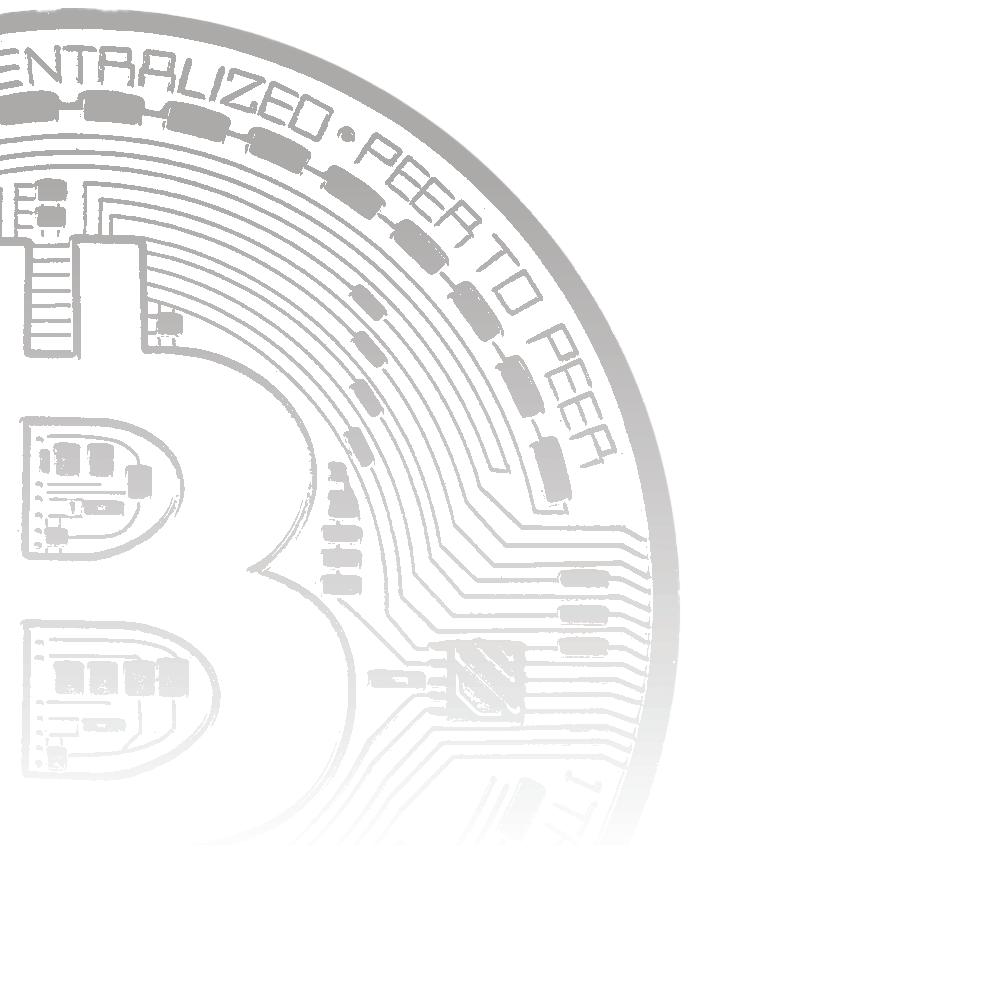
With insights from BitStarz and data from Softswiss, Gambling Insider investigates the most popular betting cryptocurrencies
By a country mile, Bitcoin (BTC) always has and likely always will be the most popular cryptocurrency, both in and outside of gambling.
Looking at its current market capitalisation, as of 23 May, Bitcoin has a total value of nearly $1.4trn. The second, third and fourth -largest cryptocurrencies by market capitalisation, Ethereum (ETH), Tether (USDT) and Binance (BNB) have a total value of $456bn, $111.7bn and $94.2bn respectively, meaning that, even when combined, they are only worth around half of what Bitcoin is.
Bitcoin dominates the market and operators know this. When designing a crypto casino or crypto sportsbook, making sure their site accepts Bitcoin or is able to convert Bitcoin to the site’s proprietary token is likely a high priority... but what about beyond that?
Rarely are payments limited to Bitcoin, with most platforms offering deposits for the top dozen or so cryptocurrencies, with some going as far as offering 30, 40+ cryptocurrencies. While none dominate quite like Bitcoin, there are whole range of coins that are typically accepted and trusted by the community, making their integration a good way of catering to a wide range of players.
As BitStarz OG Olle Dickson tells Gambling Insider: “Trust is hugely important in the crypto community and when it comes to purchasing coins you actually intend to use for purchases, you’ll most likely gravitate towards the ones with the highest market cap.” He described the key difference between currencies players intend to use for investment purposes and those used to make purchases on crypto casinos and other platforms that accept crypto
payments, stating: “I think here is where investing is a bit different as you’ll probably be more comfortable to gamble on some minor cryptocurrency for some investment, but you wouldn’t purchase it for getting your day-to-day essentials.”
So it’s safe to assume that, for the most part, crypto gambling is conducted with coins listed in the top 100 by market capitalisation, as beyond this is when a crypto could be considered ‘minor’ and a riskier investment. Providers of crypto games must also be kept in mind, as they will decide which coins they do and do not accept. Generally, they will also choose the most popular cryptocurrencies.
Dickson continues: “It’s one thing to be able to accept a currency for deposit and another for the game provider to have integrated support for that currency for wagering. So the major cryptos have a head-





start in that they are the ones that can most likely be used on most games.”
But are there any tokens that cut ahead in their use, compared to their position in the market capitalisation charts?
According to Softswiss’ State of Crypto overview (Figure 1), which accounts for over 200 brands accepting crypto payments, in the first half of 2024 Bitcoin was the topoperated cryptocurrency, accounting for 58.4% of operational transactions. This was followed by main rival Ethereum, with an operation percentage of 17.2%.
This, however, is where direct comparison to market listings end, as in third place was Litecoin (LTC) – currently the 22nd biggest cryptocurrency by market capitalisation. Oddly enough, this is understandable. Launched in 2011 as one of the first Bitcoin alternatives, Litecoin is best described as the silver to Bitcoin’s gold. The token uses a modified version of the blockchain and validation system used by Bitcoin but has been designed to be lighter in its processing, with faster and cheaper transactions making it ideal for smaller transactions. Considering the fast-paced nature of gaming, those already investing in Bitcoin may see Litecoin as a better alternative to play with, making it easier to part with than a crypto purchased for investment purposes.
Number four, according to Softswiss data, was Dogecoin (DOGE). Launched in 2013, Dogecoin was the first memecoin on the crypto market; coins that utilise popular internet trends to gather interest, with actual utility typically being an afterthought. As well as being the oldest memecoin,





Dogecoin is also the most popular, taking the number nine spot by market capitalisation as of writing. Made particularly popular by SpaceX Founder and X Owner Elon Musk, the coin itself has little utility, which has caused it to become popular among some online circles for small crypto purchases, donations and other endeavours. Musk has taken this one step further, even allowing Dogecoin to be an accepted payment option for the Boring Company’s Vegas Loop.
Moreover, there actually exists a huge amount of Dogecoins – 144.4 billion, to be exact. Compare this to the 19.7 million Bitcoin and 120.2 million Ethereum in circulation, and it can be understood why players may be more willing to play with this coin.
Finally at number five is Tether – a cryptocurrency with its value tied to the US dollar, otherwise known as a stablecoin. For those wanting to gamble with a cryptocurrency where they can have a full understanding of its value to ‘real’ money (fiat currency) and avoid market fluctuations, stablecoins provide a mostly reliable solution. Dickson, among our other contributors in this issue’s cover feature, spoke more about the use-case of stablecoins earlier. While Softswiss’ data may not reflect every crypto operator, it does set a trend that is likely to be seen across the market. The dominance of Bitcoin, followed by Ethereum, with other popular choices including stablecoins and coins designed to be used rather than stashed away for investment, is likely common, though it does raise one final question.
In short, the likelihood of an altcoin like Ethereum or Litecoin overtaking Bitcoin in terms of their use in the crypto gaming market is slim to none. But this is not to say Bitcoin’s dominance can’t be challenged, especially when considering recent statistics.
In its report, Softswiss also found that Bitcoin’s popularity had dropped by 9.4 percentage points between Q4 2023 and Q1 2024, while Ethereum and Litecoin saw increases of 4.0 and 3.8 percentage points respectively.
While Bitcoin is the most popular cryptocurrency, it is also the oldest, running on older code and displaying limitations that newer, lighter, more adaptable cryptocurrencies do not. Despite having the highest market capitalisation, Bitcoin does not have the highest trading volume, being number two in this metric. At number one is Tether, with a 24-hour trading volume of $52.6m as of 23 May. Bitcoin’s trading volume sits at $29.7m, with Ethereum in third place at $23.4m – a surprisingly small gap, considering Bitcoin’s market capitalisation of almost three times Ethereum’s.
All this is to say, it is advisable not to put all your eggs in one basket when it comes to Bitcoin. It is a fan favourite among players and a key coin to have integrated into your payment solution. But, as trends change and other tokens display their potential, opening up the floor for the wider crypto market will serve you well in the long run.
With all this talk of cryptocurrency, we felt it rude not to introduce you to a few of gambling’s most used coins

Bitcoin was the first cryptocurrency and to this day remains the most popular by market capitalisation. Designed by the anonymous Satoshi Nakamoto, Bitcoin was digital cash that could be exchanged between users via a decentralised platform (the blockchain), with the decentralised platform being monitored and upheld by machines across the world.
The Bitcoin whitepaper was launched in late 2008, with the Bitcoin network going live a few months later. There are a finite number of Bitcoins available for use and trade, which can be generated through the act of mining. This involves using a machine to validate Bitcoin transactions going onto the blockchain, which yields a small crypto reward in return.
This validation system is known as proofof-work (PoW). In this, any machine can participate in the validation process, with the machine that can prove its work in
validating the transaction first gaining the mining reward.
Bitcoin’s value has grown tremendously. In 2010, 10,000 BTC was worth roughly $40 (the amount paid in the now infamous ‘Bitcoin Pizza’ event from May of that year), yet as of writing, the value of 1 BTC is roughly $65,500 – making that pizza order worth $665m today.
In a gambling sense, the first use of cryptocurrency in games of chance was likely practiced among Bitcoin’s early adopters, testing the capabilities of blockchain technology and the various use-cases of crypto to drive its value.
Conceived in 2013 by programmer Vitalik Buterin and going live in 2015, Ethereum was seen by many as the ‘next generation’ of crypto following on from Bitcoin.
The Ethereum Network introduced the market to smart contracts. Without getting too technical, a smart contract is a set of code transferred alongside a crypto transaction that holds a set of instructions to be deployed once conditions are met. Much like a crypto transaction, smart contracts cannot be updated.
An example of how smart contracts are used can be seen with NFTs, which spiked in popularity in the early 2020s. For example, if someone was selling an NFT for 1 ETH (roughly $3,420 as of writing) and someone sent the seller the required Ethereum, then they would receive the NFT in return. These transactions are then recorded on the blockchain, leaving a permanent trail of ownership of that NFT. Ethereum also allows users to deploy decentralised applications (dAPPs) on the Ethereum blockchain, giving them a









































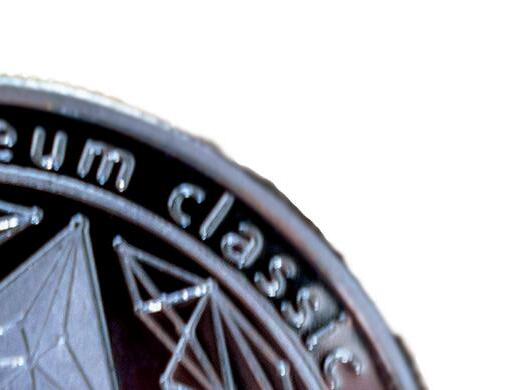







directly on the Ethereum Network. Several popular cryptocurrencies have been designed using this method, such as the ERC20 meme coin Shiba Inu, launched in 2020. Designed as a direct competitor to Dogecoin (see below), this coin was able to utlise Ethereum’s advanced technological capabilities and create its own metaverse game, NFT collection and extended coin ecosystem.

Dogecoin was launched in 2013 by software engineers Billy Markus and Jackson Palmer as a direct response to trends of the time, when crypto was growing in notoriety and becoming ‘too serious’ in the eyes of Dogecoin is often pinned as the first meme coin, a popular genre of cryptocurrency that uses current social media trends as the basis for their design. These coins are designed with less focus on utility (eg, Ethereum) and more focus on creating communities, driving the value of the coins with their routine trade and social








Dogecoin is based on the popular Doge meme of the early 2010s, and in its earlier years was used by the Dogecoin community to aid in various charitable causes and as a way to ‘tip’ various users, due to the minimal value of each coin (14m DOGE was worth roughly $11,000 in 2014).
24-hour trading volume of any cryptocurrency, even outperforming Bitcoin and Ethereum.
Touted as the ‘green crypto’ by some, Solana was launched in 2020 by Solana Labs, which was founded by Anatoly Yakovenko and Raj Gokal in 2018. Solana utilises a unique proof-of-stake model that keeps energy use low and the speed of transactions quick. At present, one Solana transaction uses roughly 0.7kJ of energy, while one post-Merge Ethereum transaction uses 144kJ of energy.
Solana also utilises many of the technological innovations brought about by Ethereum, such as dAPPs, smart contracts and a network that can be built upon by other users, with examples including the OKX exchange. However, it is not as popular as Ethereum.
The Ethereum used today is not the Ethereum that once was. In 2016 a project called The DAO (Decentralised Autonomous Organisation) was instantiated on the Ethereum blockchain. However, due to using open-source code, The DAO was hacked, with $3.6m of the $11.5m raised for the project being stolen. To stop the leak in funds, the Ethereum community made a hard-fork in the Ethereum blockchain, essentially splitting off into its own branch away from the leak.
This new branch is what is called Ethereum today, while the version of the blockchain affected by the hack is known as Ethereum Classic. Each version utilises its own cryptocurrency. The Ethereum Network also saw a major revamp in September 2022, when it executed The Merge. The Merge saw the entire network – including projects on the chain like Shiba Inu – switch its validation system from a PoW system to a proof-of-stake (PoS) system. This system selects machines to validate blockchain transactions based on the number of coins held on the system, greatly reducing the number of machines involved in the validation process and thus the amount of power used. Ethereum cut its energy use by over 99% as a result of The Merge.
Dogecoin’s value exploded in 2021 thanks in no small part to the social media attention it received from billionaire Elon Musk. On 6 January 2021, 1 DOGE was worth roughly $0.01, but by 7 May DOGE was worth $0.58. This surge saw the emergence of many other meme coins on the market, trying to capitalise on Dogecoin’s explosion in value. As of writing the value of Dogecoin has somewhat settled, currently sitting at around $0.13.

Solana was notably impacted by the collapse of FTX in 2022 – a cryptocurrency exchange that was found to have an $8bn hole in its accounts – due to FTX’s investment in the blockchain. However, after the collapse saw Solana’s market cap drop from $55bn to $3bn in a year, Solana has since recovered, how holding a market cap of $63bn.
Despite being the fifth-largest cryptocurrency by market capitalisation as of writing, according to research conducted by Softswiss (see our previous article), this has not yet reflected in the gaming market. This may be due to the higher value of the coin (1 SOL is worth roughly $137 at of 18 June 2024) or the increased value of the coin over the past year (1 SOL was worth roughly $16 on 20 June 2023).


































Launched in 2014 by Brock Pierce, Reeve Collins and Craig Sellars, Tether is a stablecoin; a cryptocurrency with a value pinned to a fiat currency, such as the US dollar.Stablecoins are able to utilise the benefits of blockchain technology (anonymity, global payments without bank interference, etc) while remaining at the same value, allowing them to avoid the sharp fluctuations often reported by other cryptocurrencies. Due to this, Tether is among the most popular cryptocurrencies to gamble with, as players remain aware of the value of their bets against a fiat value. Tether is also designed specifically for individuals, businesses and exchanges, which makes it particularly straightforward for online casinos to integrate.
As of writing, Tether has the highest








































The payments you want with the fraud protection you need
According to FTC estimates, consumer fraud is growing 30% year-over-year, with a TransUnion report adding that the gaming industry had the highest rate of suspected digital fraud in the US in 2023 at 10.9%. Fraud – and the subsequent chargebacks –will continue to be a challenge for operators, especially those who are new to the industry. While operators may try to address the problem by simply hiring more sta for risk and fraud teams, it’s a cost-prohibitive and unscalable solution. Operators should turn to their technology vendors for fraud support as an alternative to adding headcount to their risk teams. The problem here is that many payment platforms or player account management platforms offer risk rules that apply to all players, and these blanket rules often limit velocity, transaction amount and the maximum number of states tied to cards. Operators can apply strict rules to block fraudulent transactions, but these rules are often so broadly applied that they create payment friction for good (VIP) players. This may include blocking legitimate transactions or requiring players to make several consecutive deposits or withdrawals in smaller amounts. This puts operators in a tough spot, as those who apply strict rules risk losing players to increased friction, but those who apply lenient rules could risk accepting chargeback losses as a part of doing business.
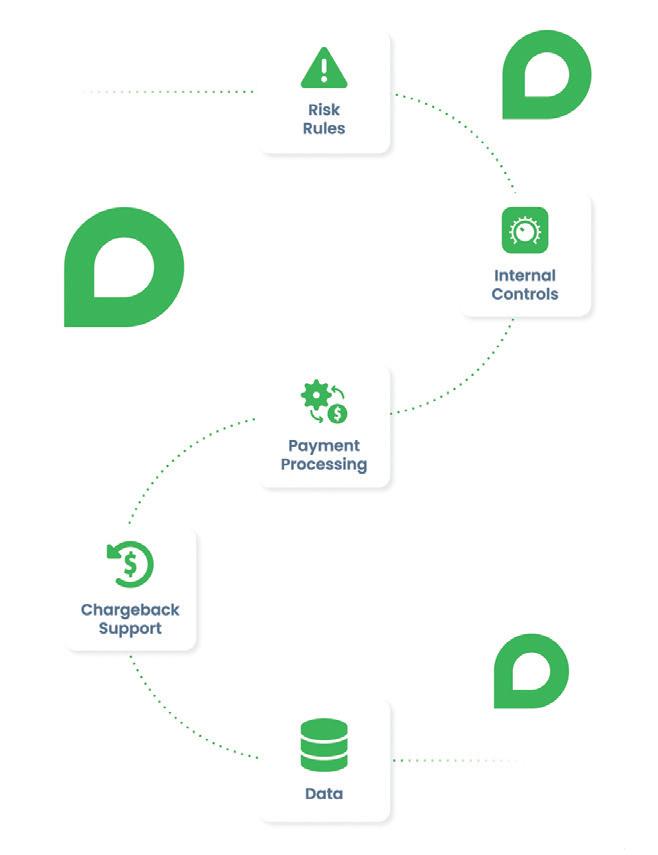



































Fortunately, there’s a better way to ght fraud. With the MoneyLine Platform powered by PayNearMe, operators gain access to a single solution for all the deposit and withdrawal options that players want, paired with a comprehensive set of embedded risk and fraud tools, allowing risk teams to monitor behaviour and head off suspicious activity with ease. PayNearMe has recently partnered with Accertify, a best-in-class provider of fraud prevention, to mitigate fraud more e ectively and efficiently with ML-driven risk scoring, community data, risk rules and a streamlined manual review interface.
PayNearMe’s newly enhanced fraud tool allows operators to evaluate players based on Accertify network data to set dynamic rules at a consumer or transaction level. Operators can set strict rules for players with higher risk scores and allow the good players to keep playing, reducing instances of false risk flagging. This risk score can accept, decline or hold transactions for manual review, combining sophisticated AI decision making with human decision making. PayNearMe’s fraud technology also augments chargeback protection by assessing each session against rich community data, enabling a secure and seamless player experience.
PROTECTION FOR ALL PayNearMe works to equip all operators –
whether established or emerging – with the fraud prevention technology they need. The powerful tools embedded into MoneyLine’s existing payment stack allows emerging operators, operators in newly legalised states, or those entering new gaming verticals to more confidently accept deposits and approve withdrawals from new players with decreased risk of unauthorised withdrawals.
Operators no longer need to choose between adding the overhead cost of growing their risk and fraud team or turning to one-sizefits-all risk rules to protect themselves. Instead, they can prevent fraud and drive profitability from a single platform. MoneyLine simplifies money movement with a fast, flexible payment experience to boost player satisfaction, while safeguarding the business with sophisticated risk and fraud prevention capabilities.
The MoneyLine platform is trusted by 9 of the 10 largest US.iGaming operators and 16 of the top 17 largest online casinos in the US. PayNearMe has been servicing the iGaming market since 2013 and is currently active in all regulated gaming markets in the US. Today, the platform offers all the major tender types available to operators, including cards, guaranteed ACH/online banking, Apple Pay, PayPal, Venmo and cash at retail.
MoneyLine, powered by PayNearMe, offers all the capabilities operators need to offer an exceptional payment experience while protecting themselves from rising fraud. To see the platform in action, visit paynearme.com/ moneyline or email sales@paynearme.com.



















































































































































































































































































































